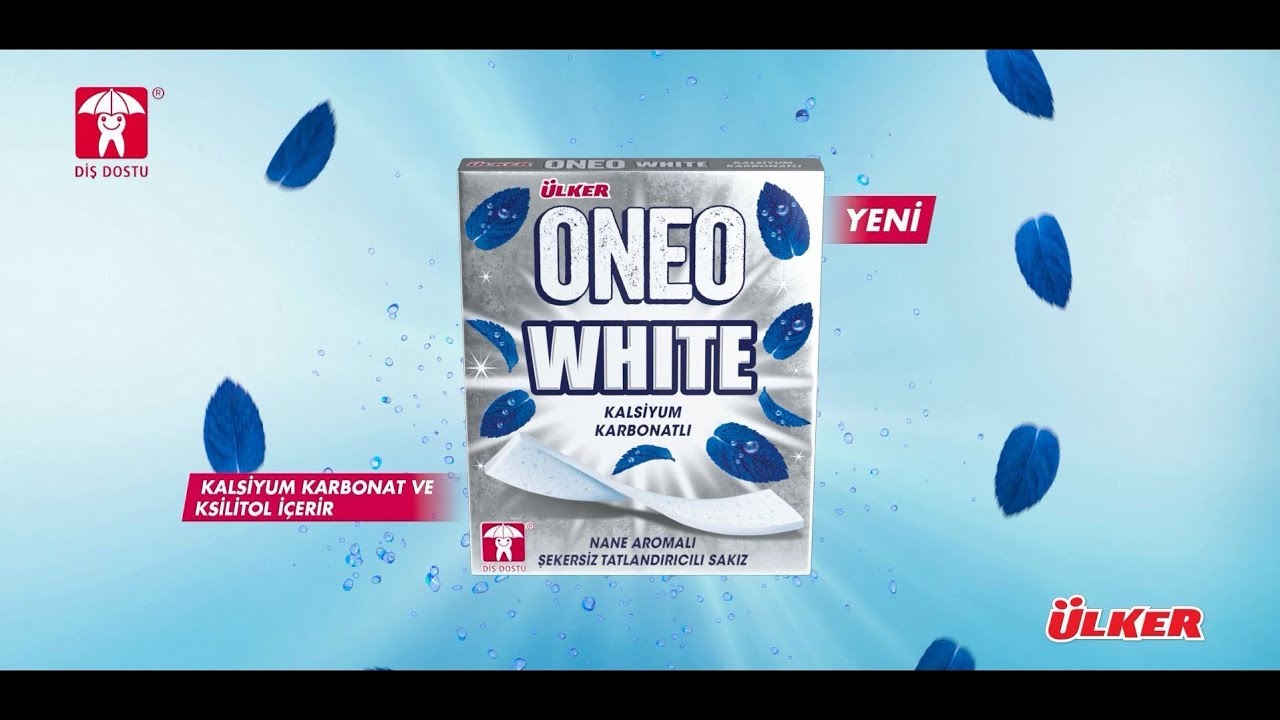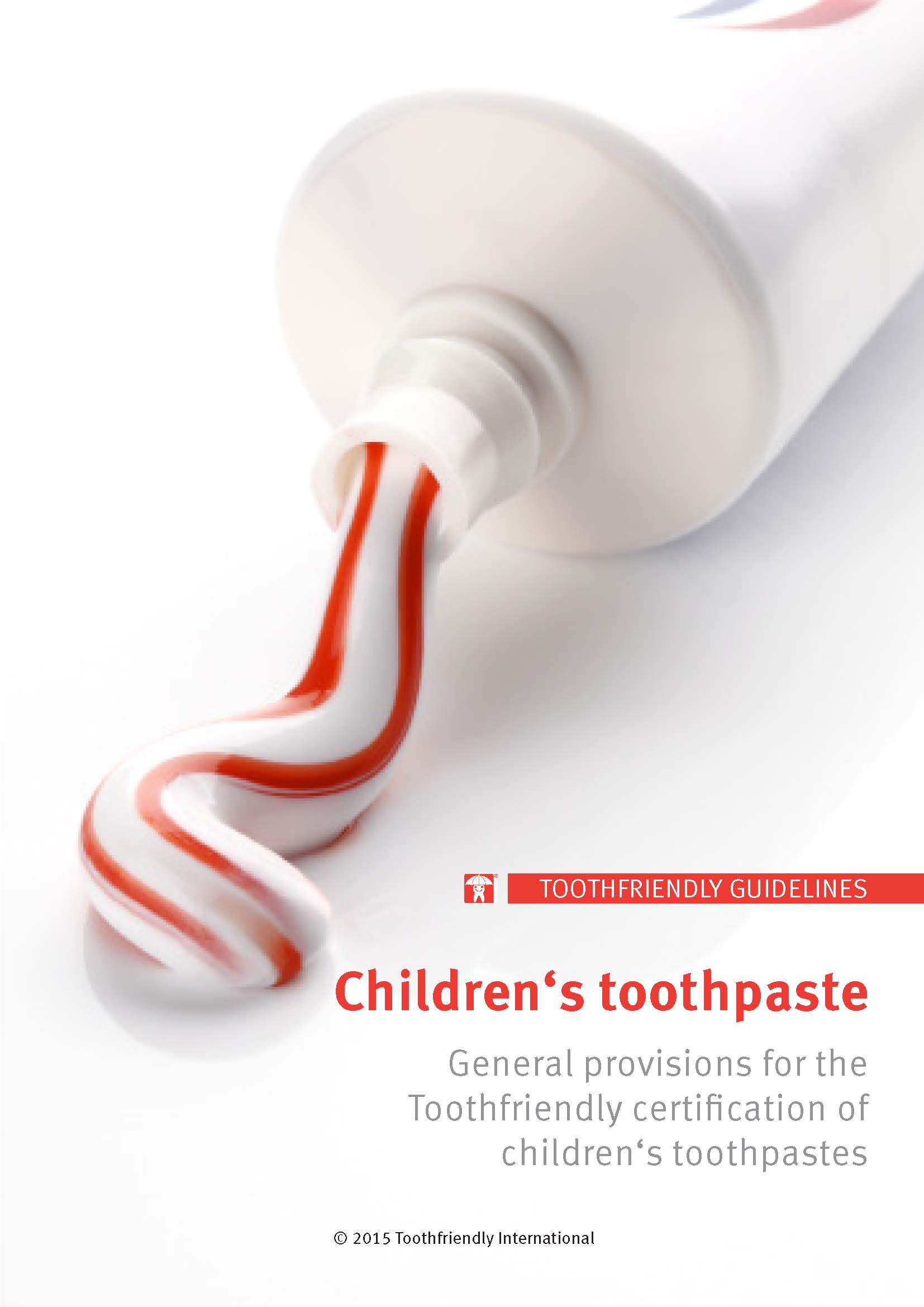
 Toothfriendly International
For better oral health
Toothfriendly International
For better oral health

WE LOOK FORWARD TO HEARING FROM YOU.
Bazooka Takes “Permission to Indulge” into Kids’ Confectionery
UK-based confectionery manufacturer Bazooka Candy Brands has launched a sugar-free chewing gum that kids can enjoy as an “everyday treat”, under the brand name Bazooka.
Offering parents a Toothfriendly reassurance, the product is a step towards the company’s aim to show that kids confectionery doesn’t have to be a high-sugar parents’ nightmare.
Amid the focus on sugar reduction, taste – a key part of the brand’s DNA – hasn’t been forgotten. Bazooka says getting the taste right with fruity concoctions such as Raspberry and Tutti Frutti was top priority.
Toothfriendly-labelled Bazooka gum was first launched in the Middle East market but further introduction is planned in Europe in 2020.
Bazooka’s plans are in line with changing consumer patters and new policies to persuade people eat less sugar. For example, the UK government has a target of reducing sugar by 20% in children’s foods by 2020.
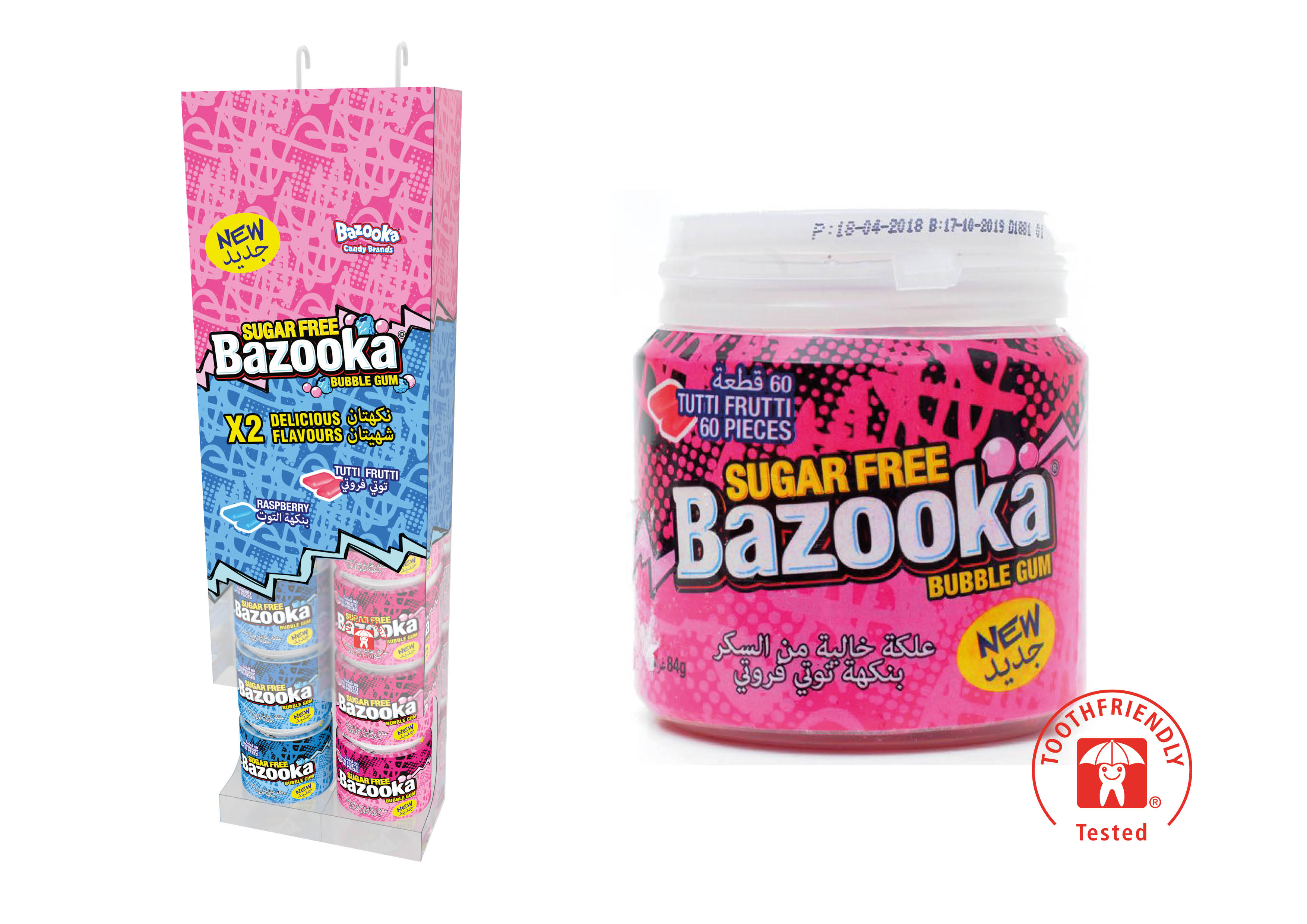
NotSore mints are Toothfriendly
Vita Pharmed, a Swiss-based supplier of high-quality OTC products, has been granted the “Toothfriendly” quality seal for its sugar-free NotSore range.
The NotSore range has undergone a stringent testing procedure determining that the products are guaranteed safe for teeth. Scientific pH-tests conducted at the University of Zurich demonstrated that the mints do not depress the plaque-pH below the critical level of 5.7. When the acid concentration falls below this threshold, teeth can be damaged.
Vita Pharmed’s NotSore is available in various sugar-free flavours, including Blackcurrent, Green Apple or Matcha Green Tea.
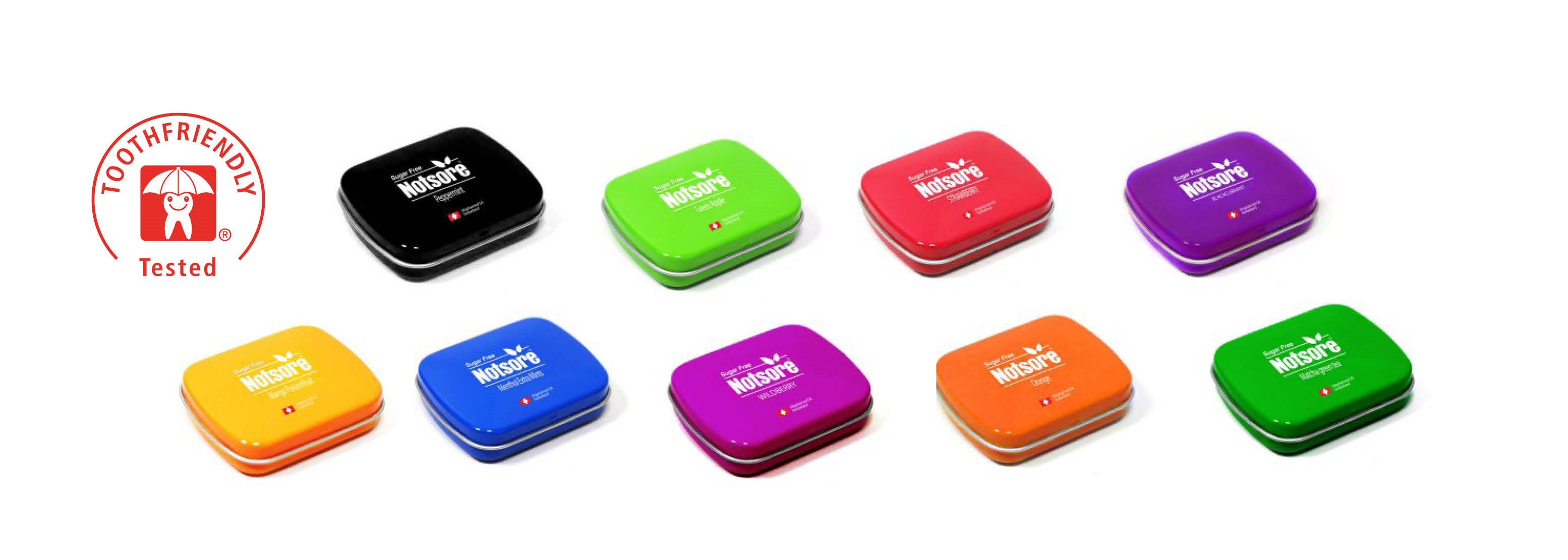
WHO says baby foods contain too much sugar
WHO study shows that a high proportion of baby foods are incorrectly marketed as suitable for infants under the age of 6 months, and that many of those foods contain inappropriately high levels of sugar.
Brussels, July 17, 2019 - A new WHO study found evidence of widespread inappropriate promotion of commercial foods for infants and young children in four cities of four European countries. Despite globally agreed rules on the promotion of foods for infants and children – and nearly 40 years since the introduction of the Code – many companies that make and sell commercial baby foods fail to comply with these rules. Broadly similar results in three countries (Austria, Bulgaria and Hungary) and, to a lesser extent Israel, suggest that the problems identified are likely to extend across the Region.
WHO urges its member countries to prevent promotion of nutritionally inappropriate products and/or use of inappropriate promotional techniques.
WHO’s long-standing recommendation states that children should be breastfed, exclusively, for the first 6 months. Its 2016 global Guidance on Ending the Inappropriate Promotion of Foods for Infants and Young Children explicitly states that commercial complementary foods should not be advertised for infants under 6 months of age.
“Good nutrition in infancy and early childhood remains key to ensuring optimal child growth and development, and to better health outcomes later in life – including the prevention of overweight, obesity and diet-related noncommunicable diseases (NCDs) – thereby making United Nations Sustainable Development Goal 3 to ensure healthy lives and promote well-being for all at all ages much more achievable,” says Dr Zsuzsanna Jakab, WHO Regional Director for Europe.
Click here to read the full press release of WHO.
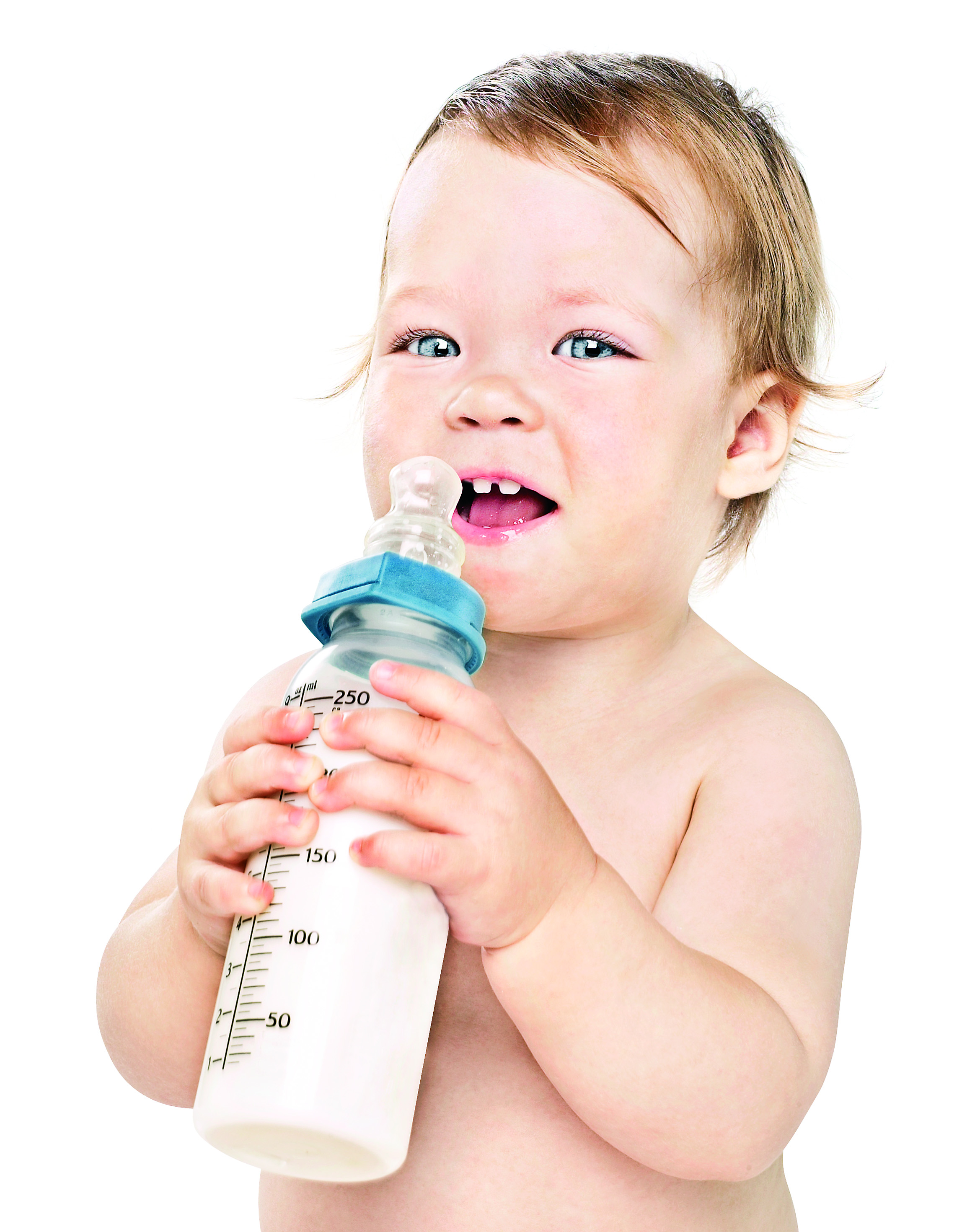
Teez toothpaste harnesses key trends for success in China
If you want to learn how to take a new toothpaste to the Chinese market successfully, one of the best case studies is new German brand Teez, which connects to all the most-important trends.
The toothpaste brand was created by German Robert Lommerzheim in 2018. Being married to a Chinese-speaking wife, he quickly saw the need for German-made, good quality oral care products for children in China. Teez’s biggest selling point is probably its origin, which is has a wide appeal on the Chinese market. Besides the "Made in Germany" statements, each product carries a prominent "Toothfriendly recommended" label. Marketing is low-cost: Teez relies heavily on social media and the power of Chinese online sales platforms.
Teez connects to the big trends of quality and provenance. In a crowded toothpaste market it’s unlikely ever to be a really big brand, but it shows what can be done with a simple visual queues, third-party endorsement and the willingness to succeed on the digital sales platforms.
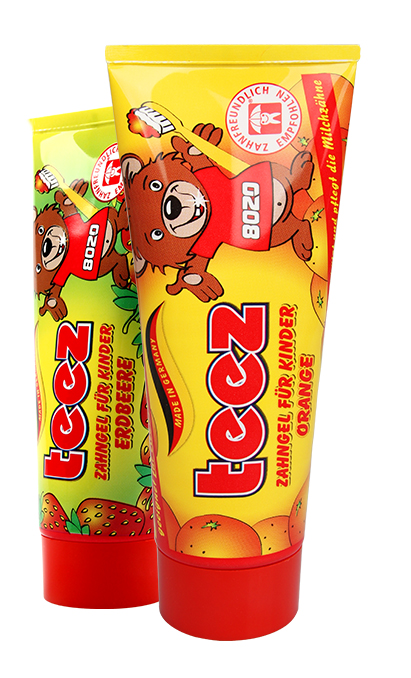
Is sugar-free chewing gum losing momentum?
With an increasing number of new niche players, and high-profile manufacturers like Mars and Mondelez investing in strong POS strategies, the sugar-free gum segment may seem like a solid performer. But recently, cracks have begun to show – a reminder that despite all the past success, the gum category may start to crumble.
While the U.S. chewing gum market still reached roughly $4.1 billion in 2018, the gum market in Europe remains a very mature and saturated category, with many countries reporting decline.
According to Euromonitor, in countries like Switzerland, the introduction of self-checkout services at the retailers has led to a continuous loss of chewing gum shelf space, as is the drift of younger consumers away from gum.
Manufacturers are trying to counter the trend by introducing brand extentions in new product formats – such as the Stimorol Mini Mints of Mondelez.
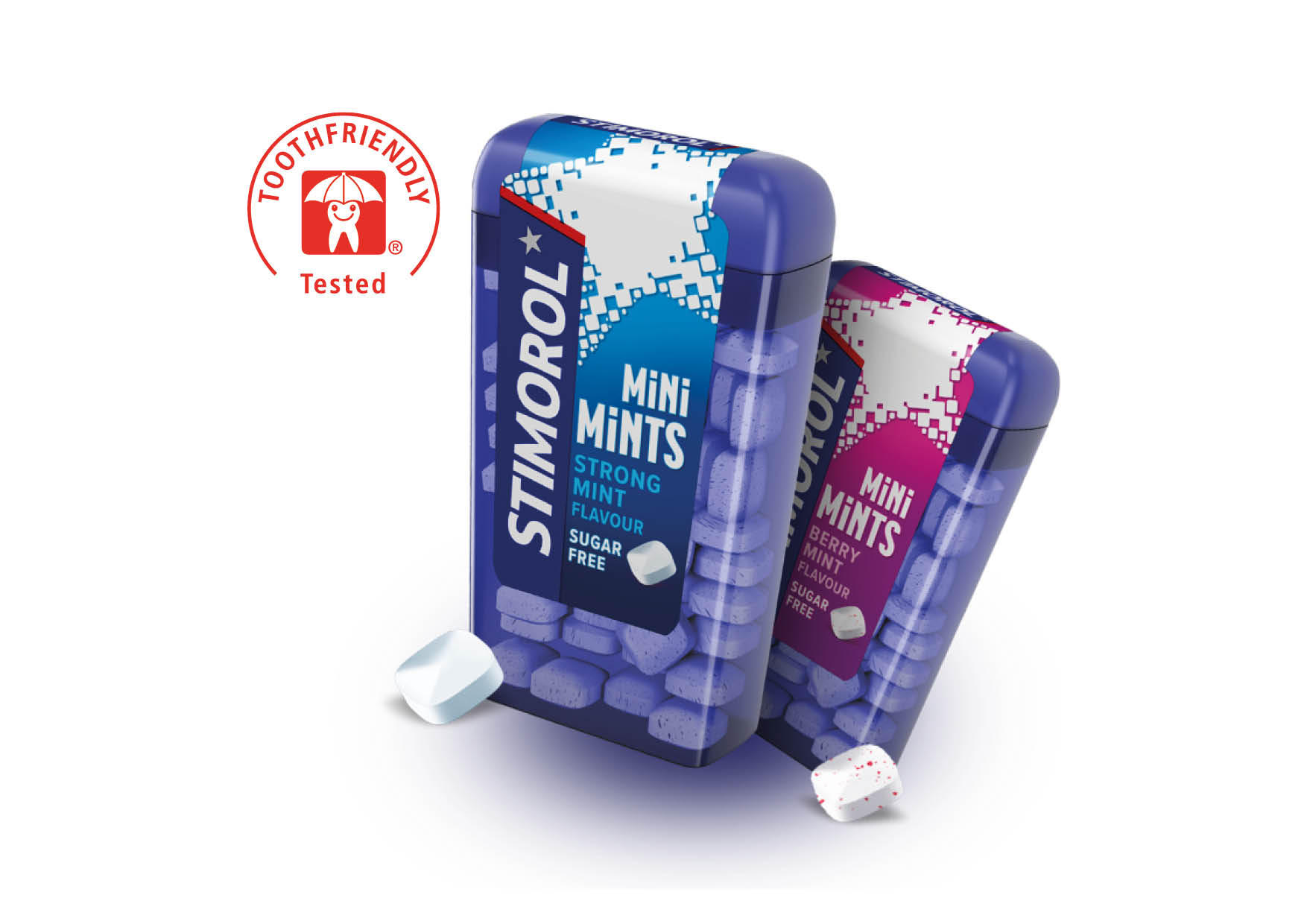
Polyol manufacturers echo this view. Roquette, French manufacturer of sugar substitute maltitol, estimates that compressed lozenges now offer bigger growth potential than gums. Especially in Asia the sugar-free mint category is booming.
So what now, gum industry? While it may be tempting to panic and chase the trends, many gum manufacturers have ultimately decided to stay in their lane. Perfetti Van Melle Group, for example, launched three new flavours under its Mentos gum range in the UK in 2018 and grew its market share significantly.
Mature or decreasing markets can be challenging for business, but they inspire companies to stretch and innovate. If you make sudden, un-requested changes, you risk losing customer trust and loyalty. That’s a big risk.
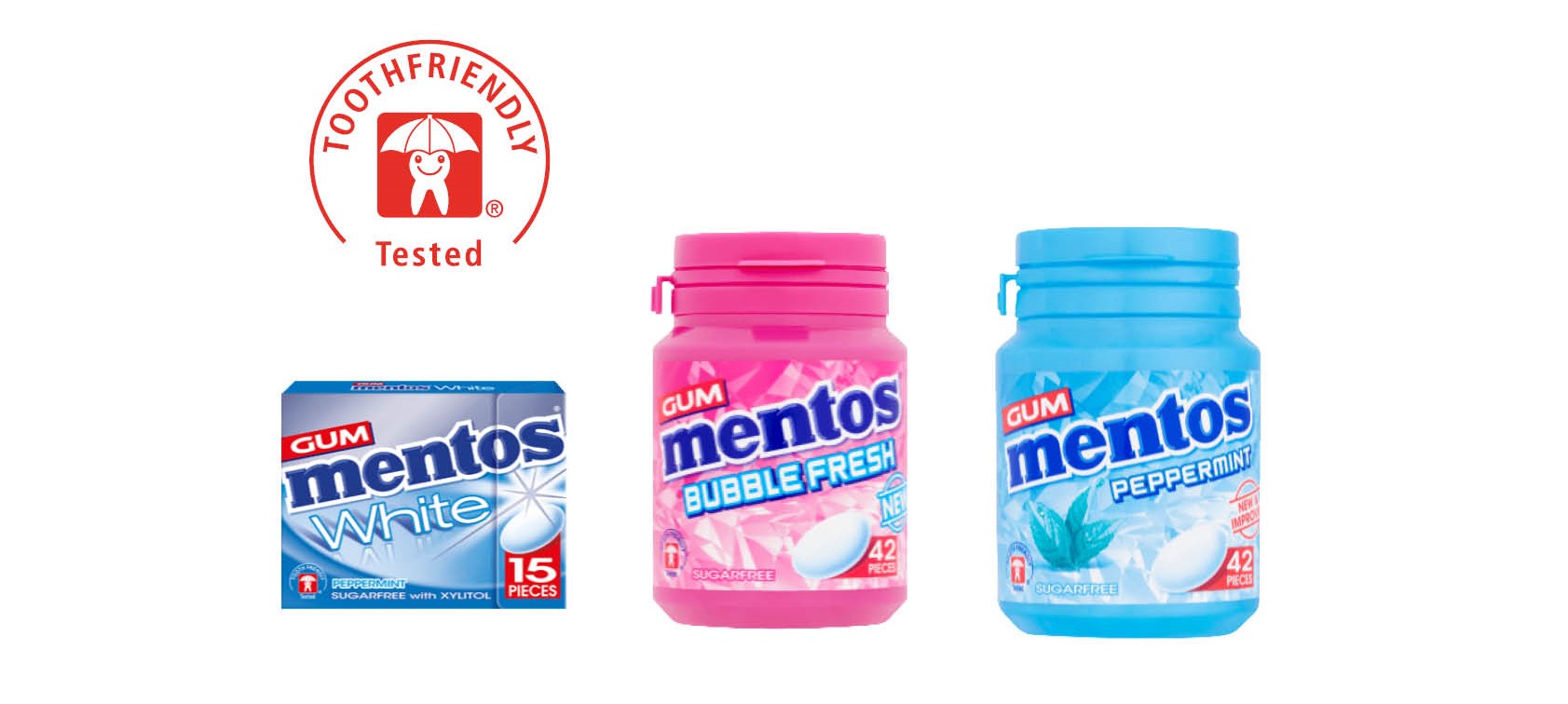
In 2019, Euromonitor estimates that European gum consumers turn towards products that offer more positive health benefits.
Changes in Management at Toothfriendly International
After leading Toothfriendly International for nearly 30 years, Dr. Albert Bär will be leaving his role as Executive Director at Toothfriendly International.
Kati Weiss, former Project Manager at TI, has been appointed acting Executive Director as of 2. April 2019.
Dr. Albert Bär will continue as Board Member of Toothfriendly Foundation, the charitable arm of the association.
“In his role as Executive Director, Dr. Albert Bär has contributed to the association’s successful growth and I want to thank Dr. Bär for great cooperation”, says Kati Weiss.
Kati Weiss has held several positions within Toothfriendly International since 2004. She has a Master of Science in Business Administration from the Turku School of Economics.
The current Board Members of Toothfriendly International include Seyhan Gücün (President), PD Dr. Klaus Neuhaus (Vice-President, Treasurer), Prof. Stefan Zimmer and Dr. Thongchai Vachirarojpisan.
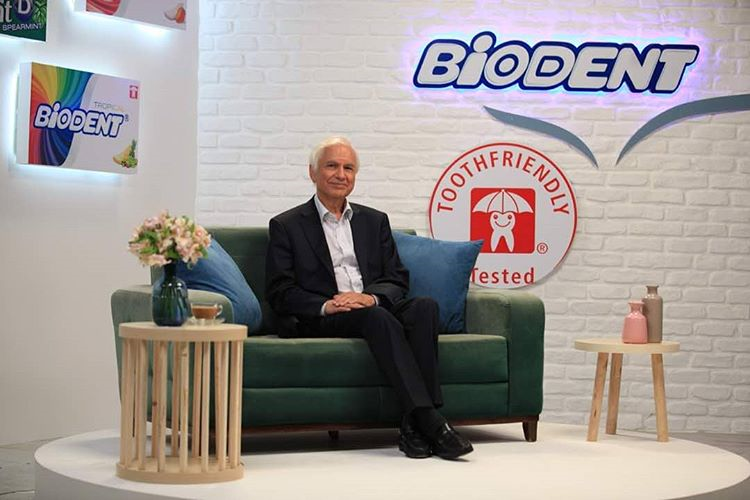
After nearly 30 years as Executive Director, Dr. Albert Bär has stepped down from his position at Toothfriendly International.
Toothfriendly at the IDS 2019
The world's largest dental fair IDS attracted again over 160'000 dental professionals from around the world to Cologne. The German Toothfriendly team (Aktion zahnfreundlich e.V) was present with a stand.
IDS 2019, Cologne Germany 12.-16.3.2019
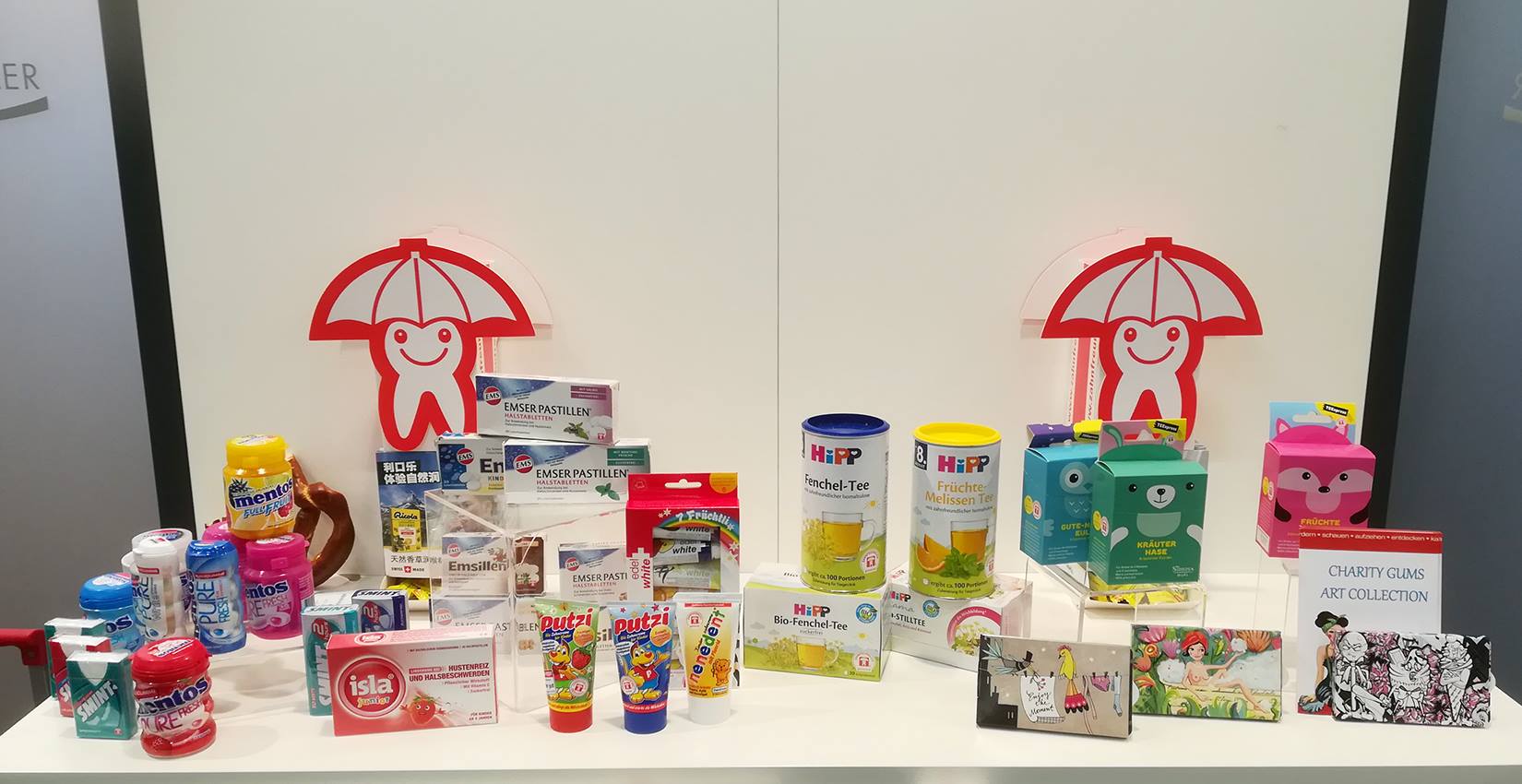
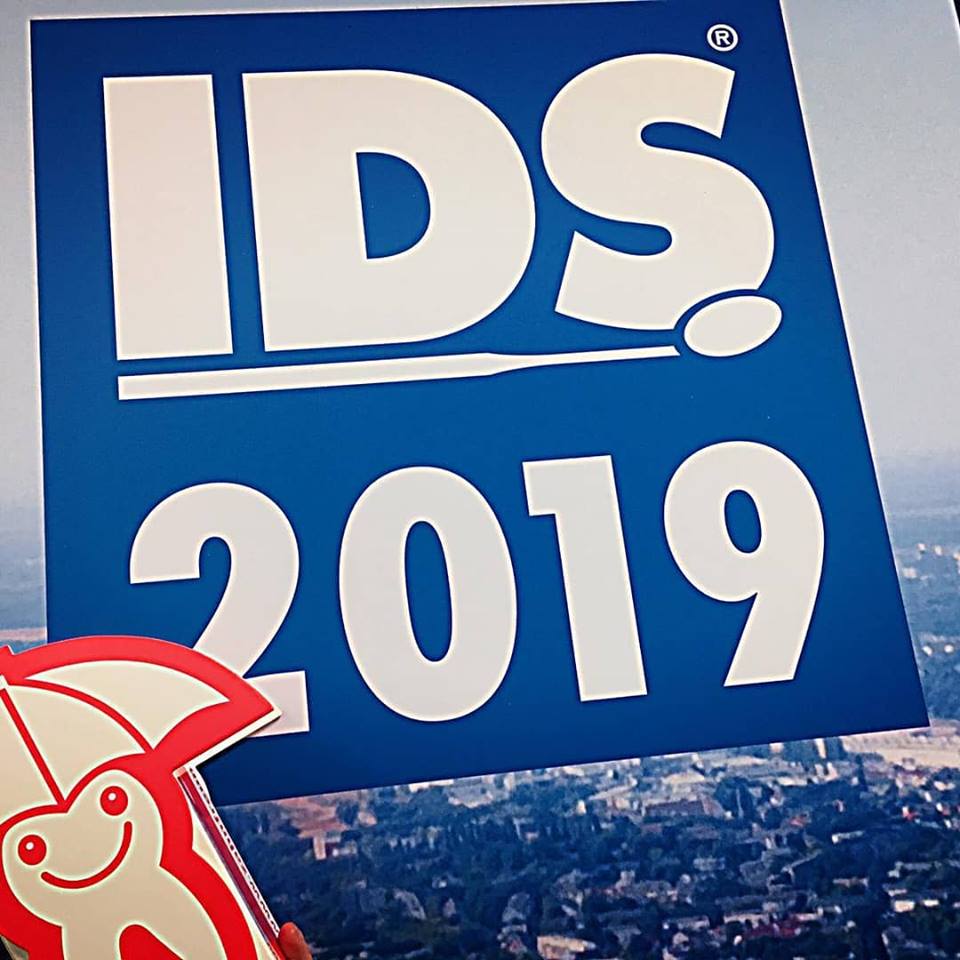

Oneo White boasts Toothfriendly credentials
In an attempt to capitalize the soaring tooth-whitening market, major Turkish chewing gum manufacturer Ülker is introducing Oneo White this winter. The product has been approved by Toothfriendly International.
To back up its product launch, Ülker is running a massive outdoor and TV campaign with the key message: Oneo White is Toothfriendly. The TV spot can be watched here.
"The market for Toothfriendly-certified chewing gum is particularly strong in Turkey, with the nation's most sugar-free gum manufacturers committed to the Toothfriendly scheme", committed Selda Alemdar, Country Manager of Toothfriendly Turkey.
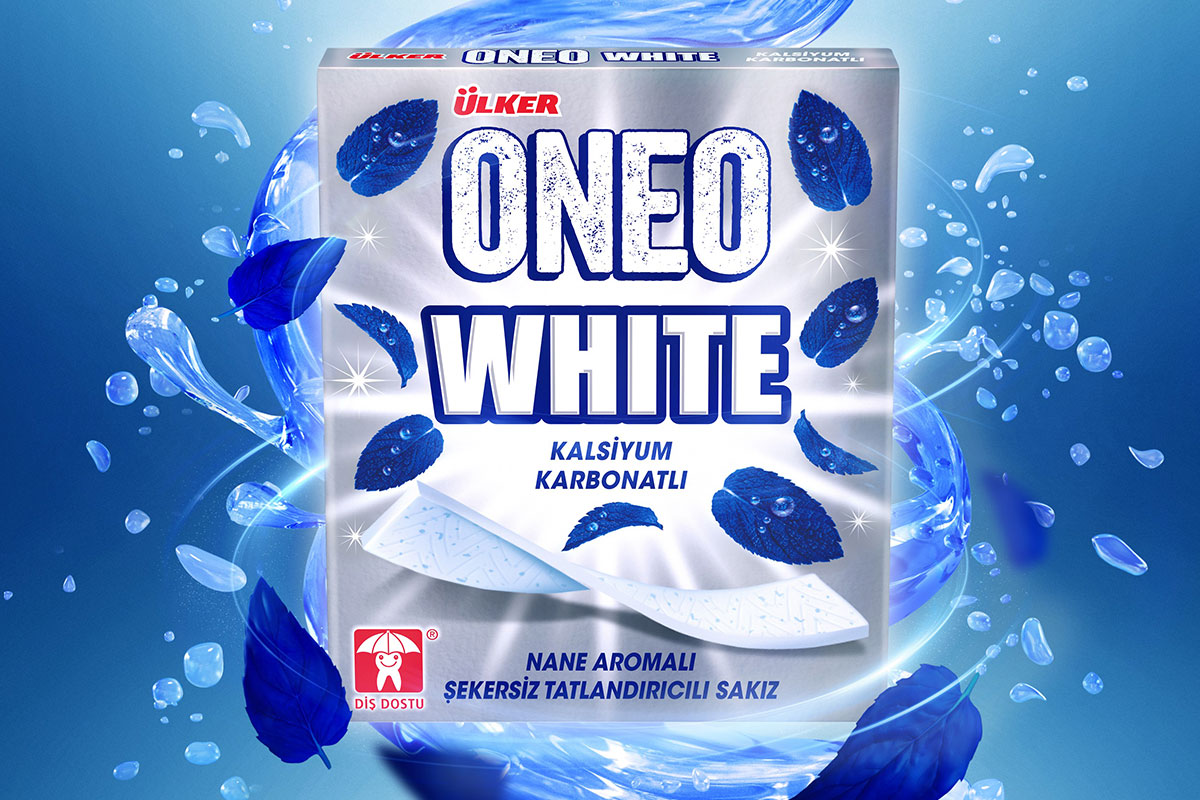

New Toothfriendly-certified products
To mark a start of a new year, four new products earned the Toothfriendly quality seal. These products can be consumed with assurance that they are safe for teeth and contribute to oral health according to Toothfriendly requirements.
Basel, January 2019
The following products may now carry the Toothfriendly seal:
- Stimorol Cool Candy
- Ökoase children's toothpaste
- Erythritol sweetener
- Bazooka chewing gum
The Toothfriendly accreditation means that the product meets high standards: only products that contribute to oral health may carry the Toothfriendly label. Foods, medicinal products and food ingredients can be considered safe for teeth if they are neither cariogenic nor erosive. These "Toothfriendly" properties are determined in a standardized in vivo plaque pH-telemetry test conducted by independent University Dental Institutes.
Oral care products must demonstrate safety and efficacy according to requirements set by Toothfriendly International. Children's toothpaste products must, for example, contain 500 ppm bioavailable fluoride.
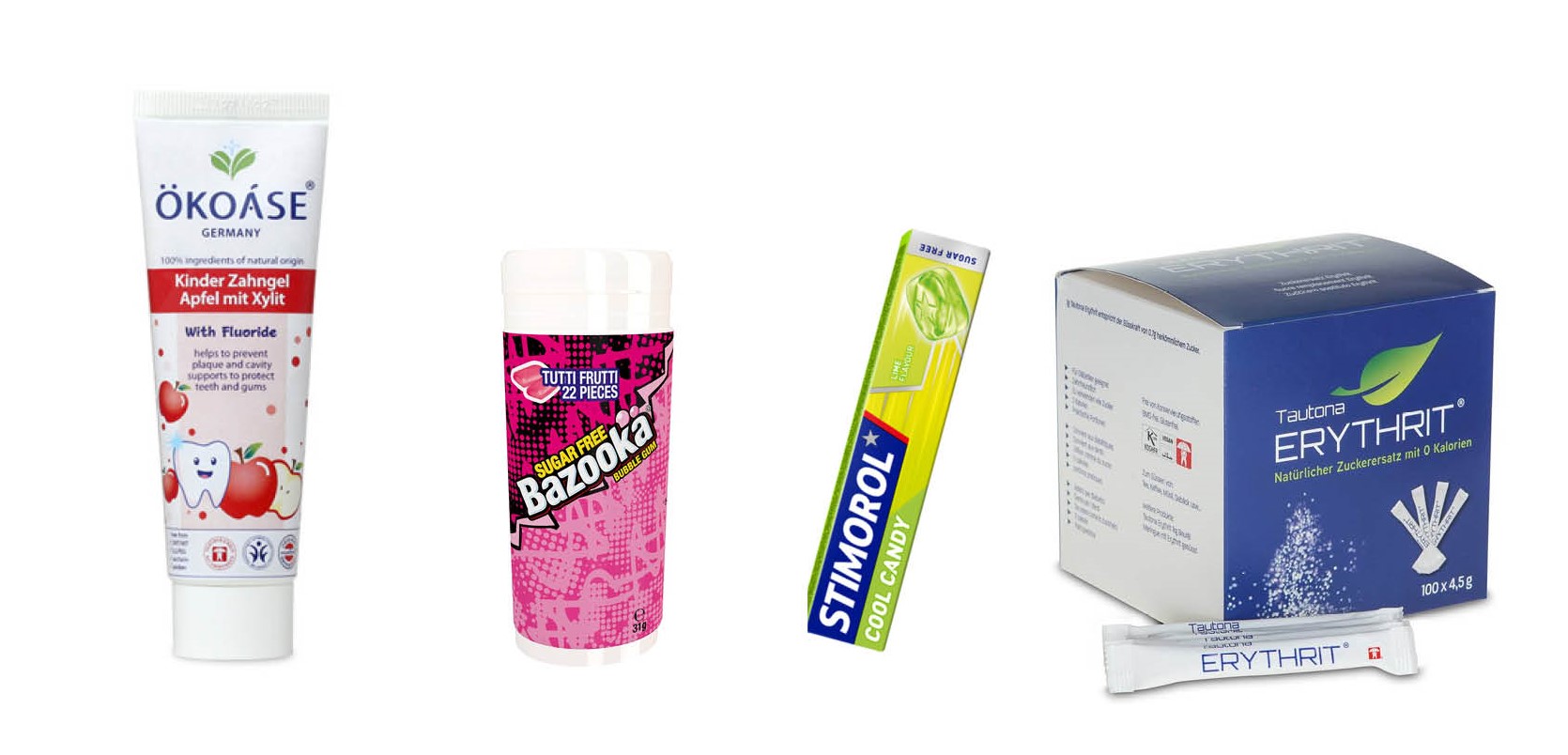
Washdent accredited by Toothfriendly International
Washdent, a food supplement product of Mitelos, Spain, has qualified for the Toothfriendly certification.
December 11, 2018 - Basel, Switzerland
After being tested at the University of Zurich Dental Institute in Switzerland, Washdent has the relevant expert's statement affirming that it is safe for teeth. The test that is referred to is the intraoral plaque-pH telemetry test used to measure the dental properties of foods and food ingredients.
Washdent (www.washdent.eu) is currently being marketed in the United Kingdom and will be launched soon in 8 more countries. Washdent is a food supplement developed to clean the teeth when there is no time or bathroom available for brushing the teeth. The supplement is sweetened with xylitol and also contains calcium.
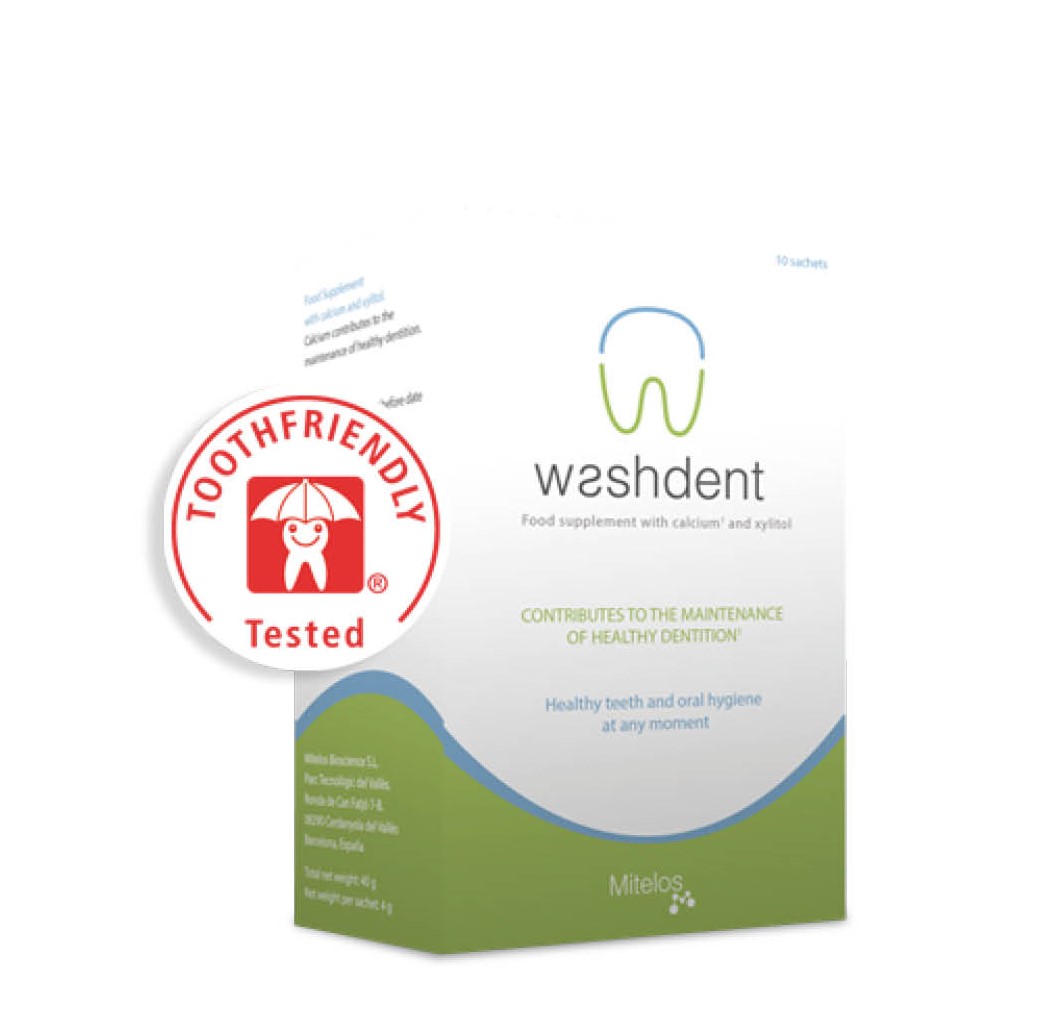
Masterfoodeh becomes the first Toothfriendly-approved gum manufacturer in Iran
Masterfoodeh, a company based in Tehran, Iran, has become the first in the country to be accredited by Toothfriendly International.
August 1, 2018 - Basel, Switzerland
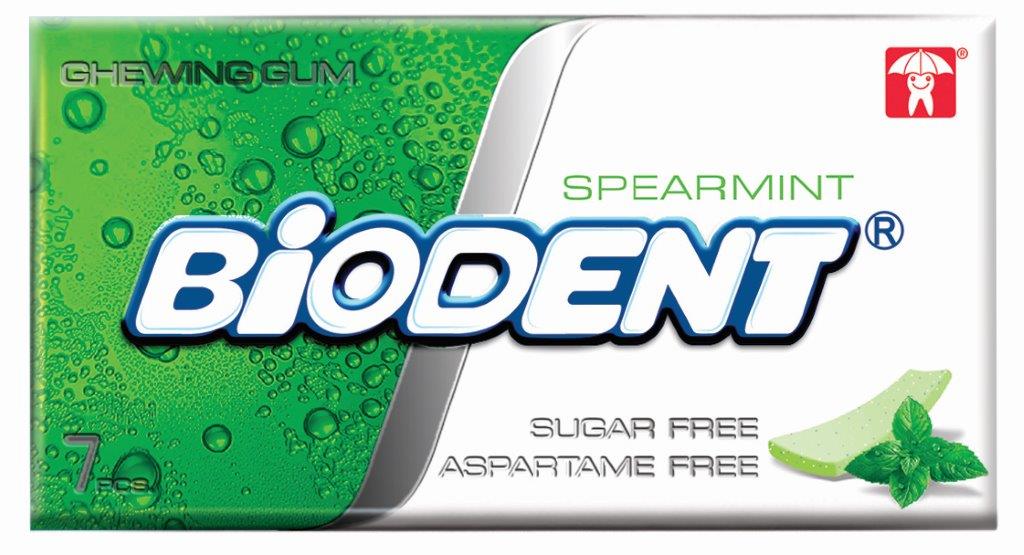 The company’s Biodent chewing gum range qualifies for the “Toothfriendly” label as it demonstrably causes neither caries nor erosion. The product was tested at the Dental Institute of Zurich University in Switzerland and has the relevant expert’s statements affirming that it is safe for teeth.
The company’s Biodent chewing gum range qualifies for the “Toothfriendly” label as it demonstrably causes neither caries nor erosion. The product was tested at the Dental Institute of Zurich University in Switzerland and has the relevant expert’s statements affirming that it is safe for teeth.
The test that Toothfriendly International is referring to is the intraoral plaque-pH telemetry method used to measure the dental properties of foods and food ingredients. The test is routinely conducted by a handful of University dental faculties worldwide. It is also recognized by the EFSA and the US FDA for identifying foods and food ingredients that are non-cariogenic and non-erosive.
Dr. Albert Bär, Executive Director of Toothfriendly International, congratulated Masterfoodeh on being the first Iranian confectionery manufacturer with Toothfriendly credentials. “Masterfoodeh is committed to oral health promotion and achieving new standards with its Toothfriendly-approved Biodent products. We are excited to see the pace of development of the sugar-free market in Iran and the innovation that Masterfoodeh is doing.”
Dr. Bär also took part in a launch ceremony organized by Masterfoodeh in Tehran, Iran, during 1.-2. August 2018.
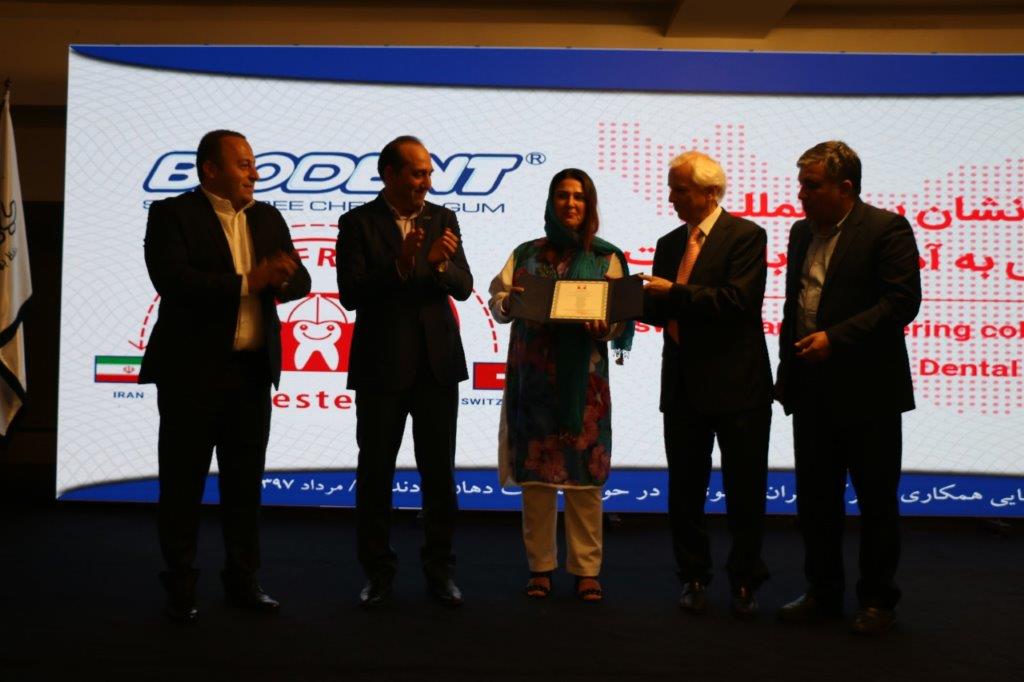
Toothfriendly at Sino-Dental 2018
Toothfriendly International presented the range of Toothfriendly-accredited products at the Sino-Dental 2018 trade show held in Beijing, China 9.-12. June 2018.
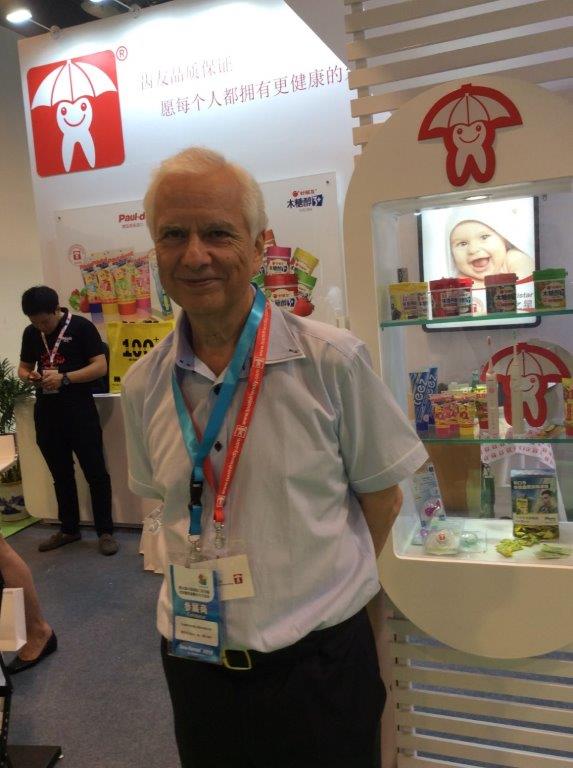 The Sino-Dental trade fair attracts annually over 100'000 dental professionals to the capital city of China. Toothfriendly International used the trade fair as an optimal location to kick off the promotion of Toothfriendly labelling scheme in China.
The Sino-Dental trade fair attracts annually over 100'000 dental professionals to the capital city of China. Toothfriendly International used the trade fair as an optimal location to kick off the promotion of Toothfriendly labelling scheme in China.
"We are here with one key mission: to increase the awareness of caries prevention among the Chinese consumers" said Dr. Albert Bär, the Executive Director of Toothfriendly International. "With the introduction of the Toothfriendly label in China, we want to make healthy choices easy choices also for the Chinese consumers."
In Europe, manufacturers use the "Toothfriendly" seal for more than thirty years to inform consumers about the proven dental benefits of their products. In China, the first products to carry the label are Orion’s chewing gum, Paul-dent, Putzi and Teez toothpaste, Dentistar pacifier and sugar-free Ricola lozenges.
Toothfriendly Exhibits at Food Ingredients China 2018
Visit us at FIC 2018, Shanghai, China (22nd-2th March 2018), Hall 6, 61D12
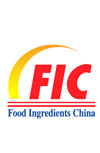 At FIC China 2018, Toothfriendly International will be showcasing a variety of Toothfriendly confectionery and spoon-for-spoon sweeteners, as well as beverages, toothpaste and medicinal products. Toothfriendly International is partnering in a joint booth with Beneo, one of the leading manufacturers of functional ingredients, at FIC China to highlight the importance of creating products that promote good oral health.
At FIC China 2018, Toothfriendly International will be showcasing a variety of Toothfriendly confectionery and spoon-for-spoon sweeteners, as well as beverages, toothpaste and medicinal products. Toothfriendly International is partnering in a joint booth with Beneo, one of the leading manufacturers of functional ingredients, at FIC China to highlight the importance of creating products that promote good oral health.
Beneo's PalatinoseTM (isomaltulose) is a low-glycemic, disaccharide carbohydrate that is fully digestible as well as being Toothfriendly. Another Toothfriendly sugar replacer from BENEO is ISOMALT, a naturally-sorced sugar replacer. ISOMALT is made from pure beet sugar, which gives it a natural taste and sweetness while being sugar-free.
With nearly 1400 exhibitors and over 48'000 visitors in 2017, Food Ingredients China (FIC) is the largest and most authorative international show in the food ingredients industry in China.

The Toothfriendly team (Shen Yizheng, Kati Weiss and Dr. Albert Bär at the Toothfriendly / Beneo booth)
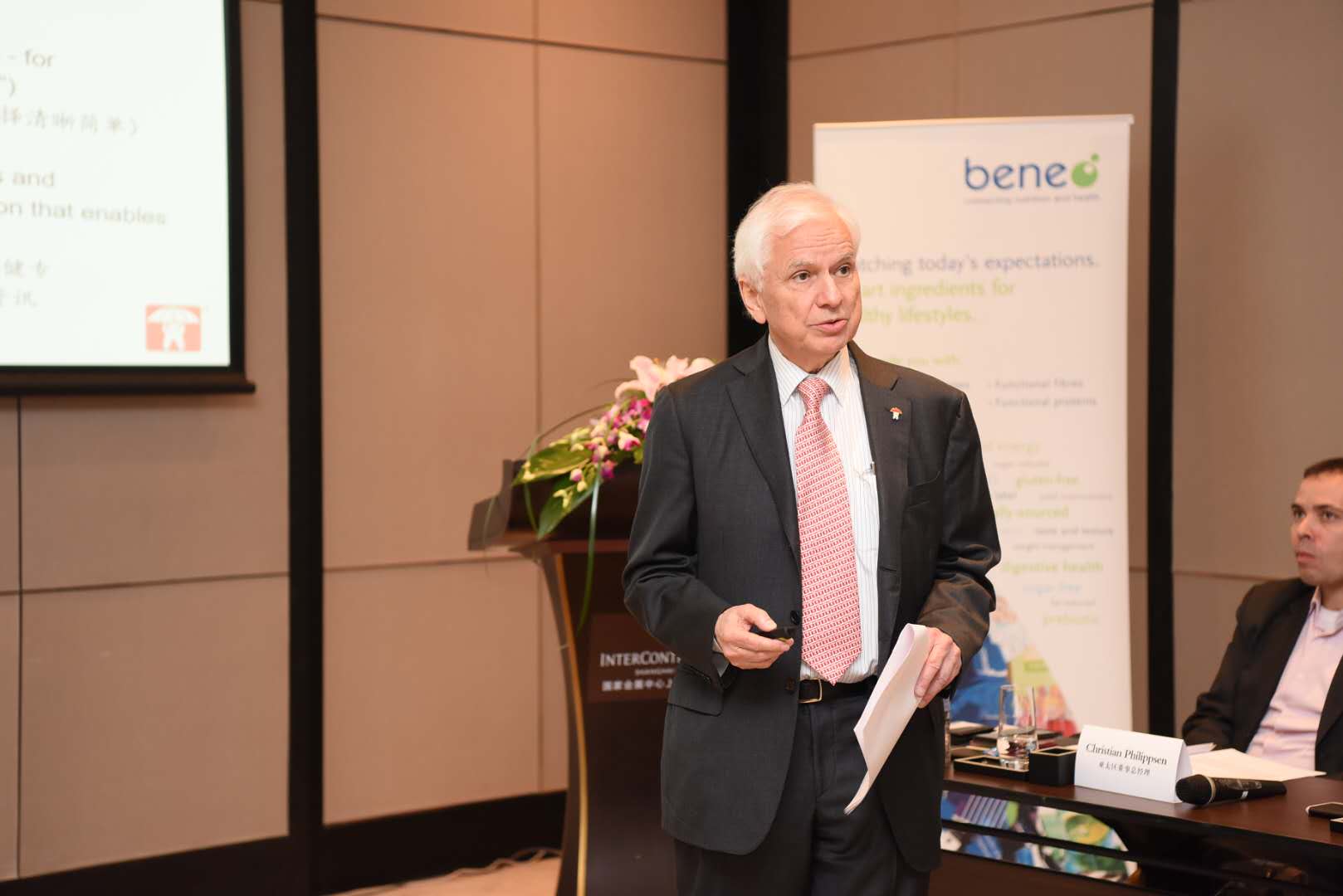 Dr. Albert Bär giving a presentation at the media conference organized by Beneo during the FIC event.
Dr. Albert Bär giving a presentation at the media conference organized by Beneo during the FIC event.

Toothfriendly Turkey wins gold award for best special event 2017
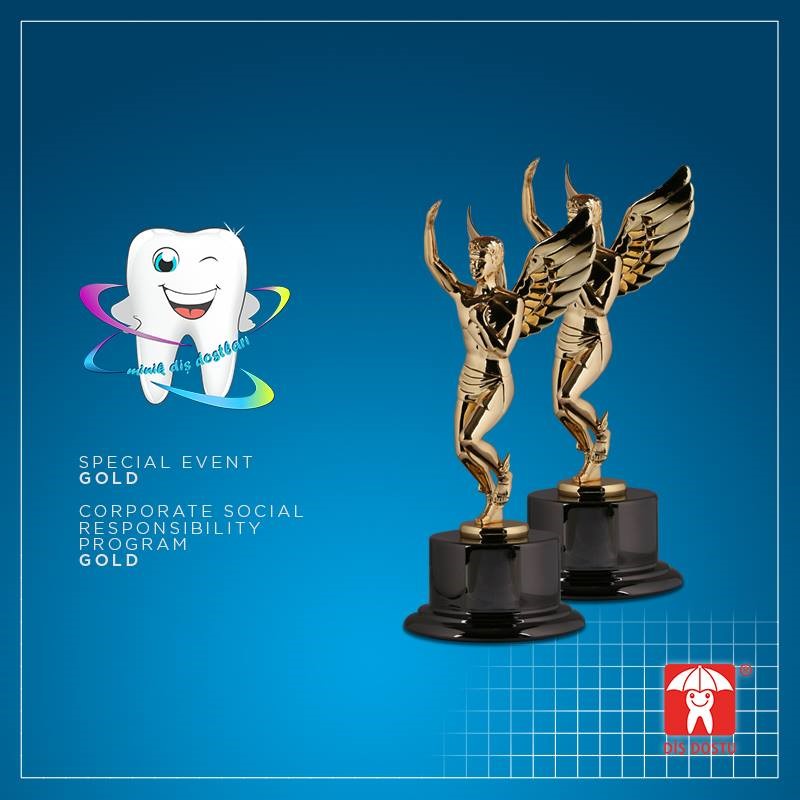
Taking care of the teeth can be fun - Turkey's Toothfriendly team "Dis Dostu" demonstrates that this can be reality: They took home the Hermes Creative Awards 2017 for best corporate social responsability campaign in Turkey.
Dis Dostu's campaign was awarded for promoting oral health awareness in a fun and attractive way. The oral health road show visiting Turkish malls included interactive games, giant toothbrushes and a real-life Tooth Fairy for the families to take pictures with.
Toothfriendly International salutes the strong committment of Carrefour, Colgate and other local partners of the campaign.
Kids toothpaste gets certified
Two new toothpaste products have been granted the "Toothfriendly recommended" -seal.
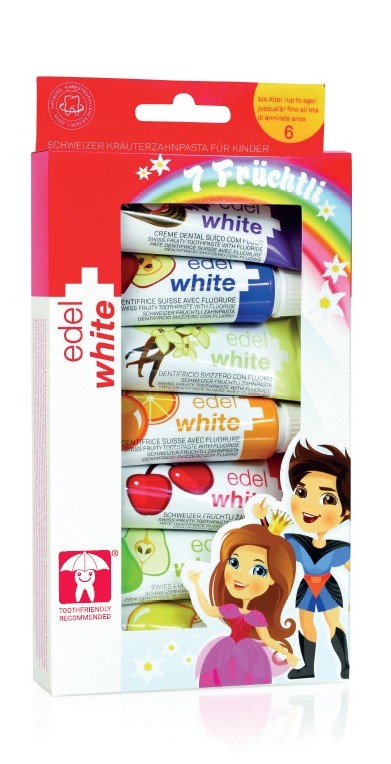
The Swiss-based oral care specialist Scanderra has revamped its Edel+White children's toothpaste line to fulfil the Toothfriendly criteria. Available in seven flavours, Scanderra's Edel+White kids toothpaste comes in a 7 x 9.4 ml set to create an element of variety and fun to the sometimes stressful event of brushing one's kids teeth.
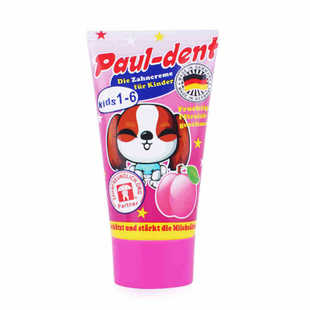 Meanwhile in Asia, a new Toothfriendly-endorsed range of premium kids toothpastes and toothbrushes has been introduced for the rapidly expanding Chinese oral care market. The line named Paul-Dent debuted in Spring 2017 and includes four toothpaste flavours - strawberry, tutti frutti, prune and banana - sold in 50 ml tubes.
Meanwhile in Asia, a new Toothfriendly-endorsed range of premium kids toothpastes and toothbrushes has been introduced for the rapidly expanding Chinese oral care market. The line named Paul-Dent debuted in Spring 2017 and includes four toothpaste flavours - strawberry, tutti frutti, prune and banana - sold in 50 ml tubes.
Oral care companies wishing to display the Toothfriendly endorsement on their product labels need to comply with provisions that have been laid down by Toothfriendly International.
Toothfriendly-certified Orion gum hits the shelves in China
Orion is the first major Chinese company to commit to Toothfriendly labelling scheme. Orion's Xylitol 3+ chewing gum has been scientifically tested by dental experts and is guaranteed safe for teeth.
6. June 2017, Basel
 Orion, one of Asia's largest confectionery manufacturers, receives the "Toothfriendly" endorsement from the dental experts of the Toothfriendly International organization for its chewing gum range. Orion's Xylitol 3+ gums have undergone a stringent testing procedure.
Orion, one of Asia's largest confectionery manufacturers, receives the "Toothfriendly" endorsement from the dental experts of the Toothfriendly International organization for its chewing gum range. Orion's Xylitol 3+ gums have undergone a stringent testing procedure.
Scientific pH-tests demonstrated that Orion's gum has no risk for caries or erosion, as it does not depress the plaque-pH below the critical level of 5.7. When the acid concentration falls below this threshold, teeth can be damaged. Orion's xylitol-based gum is the first major Chinese product to fulfill the criteria, and has been granted the recognized "Toothfriendly" quality seal.
"Dentists welcome Orion's new gum range", confirms Dr. Albert Bär of Toothfriendly International. "We are thrilled to see the first Chinese manufacturer to join Toothfriendly's program. The surge of sugar-free and Toothfriendly products will benefit the oral health of millions of consumers across the country."
Dr. Bär sees great potential for Toothfriendly-labelled products in China. "The market for healthier snacks is still largely an untapped market, though consumer demand for functional candy is rising rapidly. We believe that the Chinese consumers will pick up the Toothfriendly concept fast.
According to market analyst Mintel, three in four Chinese consumers consumed gum and three in five ate mints in 2016. Out of all mint consumers, 45% ate functional candy such as throat soothing lozenges or vitamin-enriched candy.
---
Link to Orion's Xylitol 3+ website: http://gumevent.orion.cn
App helps dentists recommend Toothfriendly diet
German Toothfriendly Association is launching new smartphone application "Zahnfreundlich" to educate dental professionals about Toothfriendly nutrition.
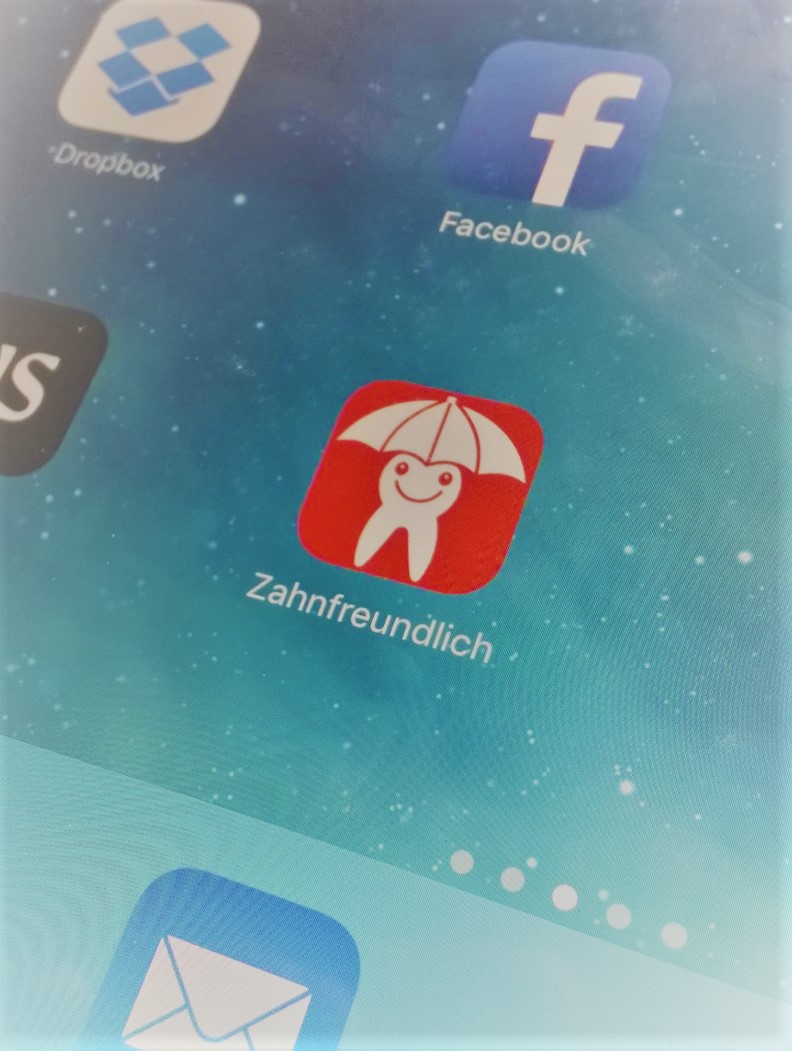 23. March 2017, Cologne - Consumers may not know which foods are optimal for oral health, but dentists should - that's the thinking behind a new digital platform which coaches dental professionals about food choices.
23. March 2017, Cologne - Consumers may not know which foods are optimal for oral health, but dentists should - that's the thinking behind a new digital platform which coaches dental professionals about food choices.
The smartphone technology makes it easy to fit continued education around other work, and nutritional councelling can be used effectively with a variety of patient groups. The app also awards professional users with credit points for successfully passed exams.
The learning modules of the app include topis such as sweeteners, food acids, product labelling and the role of saliva in plaque acid neutralization. The modules are developed by Aktion Zahnfreundlich e.V. and presented by Prof. Stefan Zimmer, the President of the association and Professor of Preventive Dentistry at the University of Witten/Herdecke in Germany.
The "Zahnfreundlich" app can be downloaded free by iPhone/iPad and Android users.

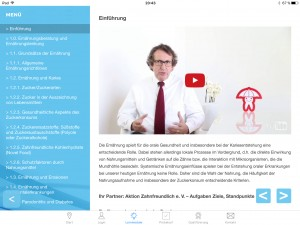
Toothfriendly at the IDS 2017
Experience all new Toothfriendly products and services at the International Dental Show in Cologne 21-25. March 2017.
Toothfriendly is exhibiting in a joined booth with the German Dental Chamber (Bundeszahnärztekammer) – visit us at the hall 11.2, O/P 50/59. The German Toothfriendly team will be presenting product novelties as well as a brand new Toothfriendly app targeted at dental hygienists and other oral health professionals.
The International Dental Show (IDS) is the world's largest dental trade fair. In 2017, the show is expected to attract over 130‘000 dental professionals around the world. Opening hours are daily from 9:00 am to 6:00 pm. We are looking forward to welcoming you in Cologne!
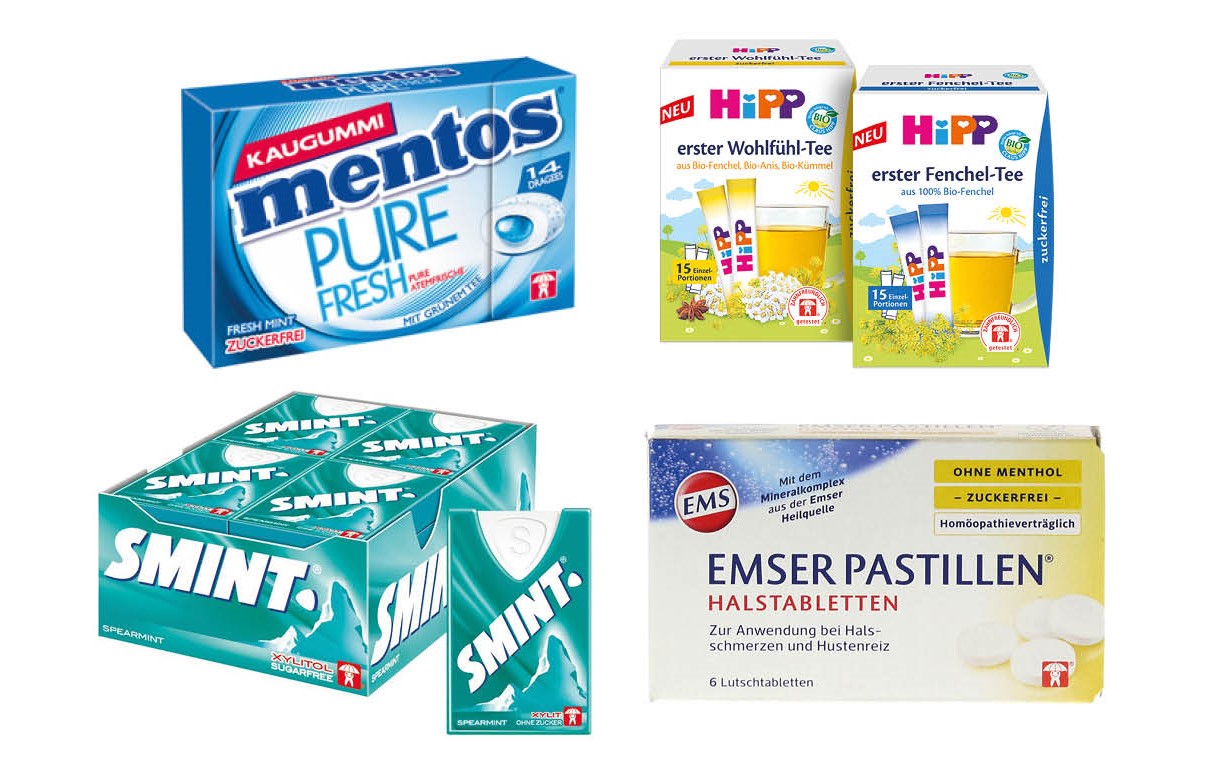
Toothfriendly at the ISM 2017
Toothfriendly International will exhibit at the ISM confectionery fair taking place in Cologne 29.1-1.2.2017. On its stand, the Toothfriendly team will present new product concepts that combine dental benefits with the great taste.
Mentos Ice Cup chewing gums and Impact Fresh mints are among this year’s product novelties carrying the Toothfriendly label. Besides confectionery, a wide range of Toothfriendly-certified oral care products, beverages, spoon-for-spoon sweeteners, pacifiers and medicinal products will be showcased at the booth.
The Toothfriendly booth is located in the aisle between halls 10 and 11. We are looking forward to meet you in Cologne!
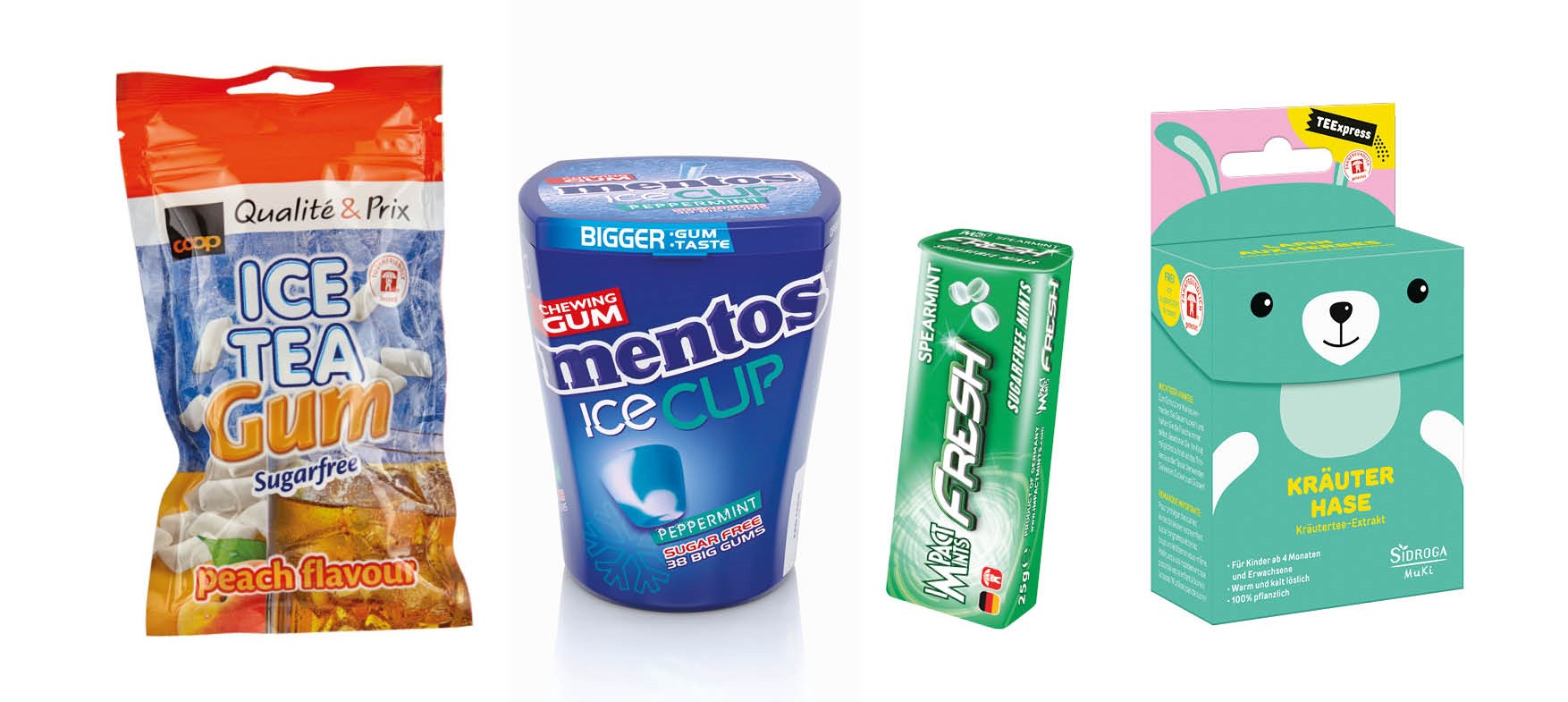
"Anti-sugar" trend powers Toothfriendly product sales
Consumers bought more Toothfriendly products in most markets in 2015, but it's not just because there are more products available; they are also more conviced to avoid sugar, researchers have found.
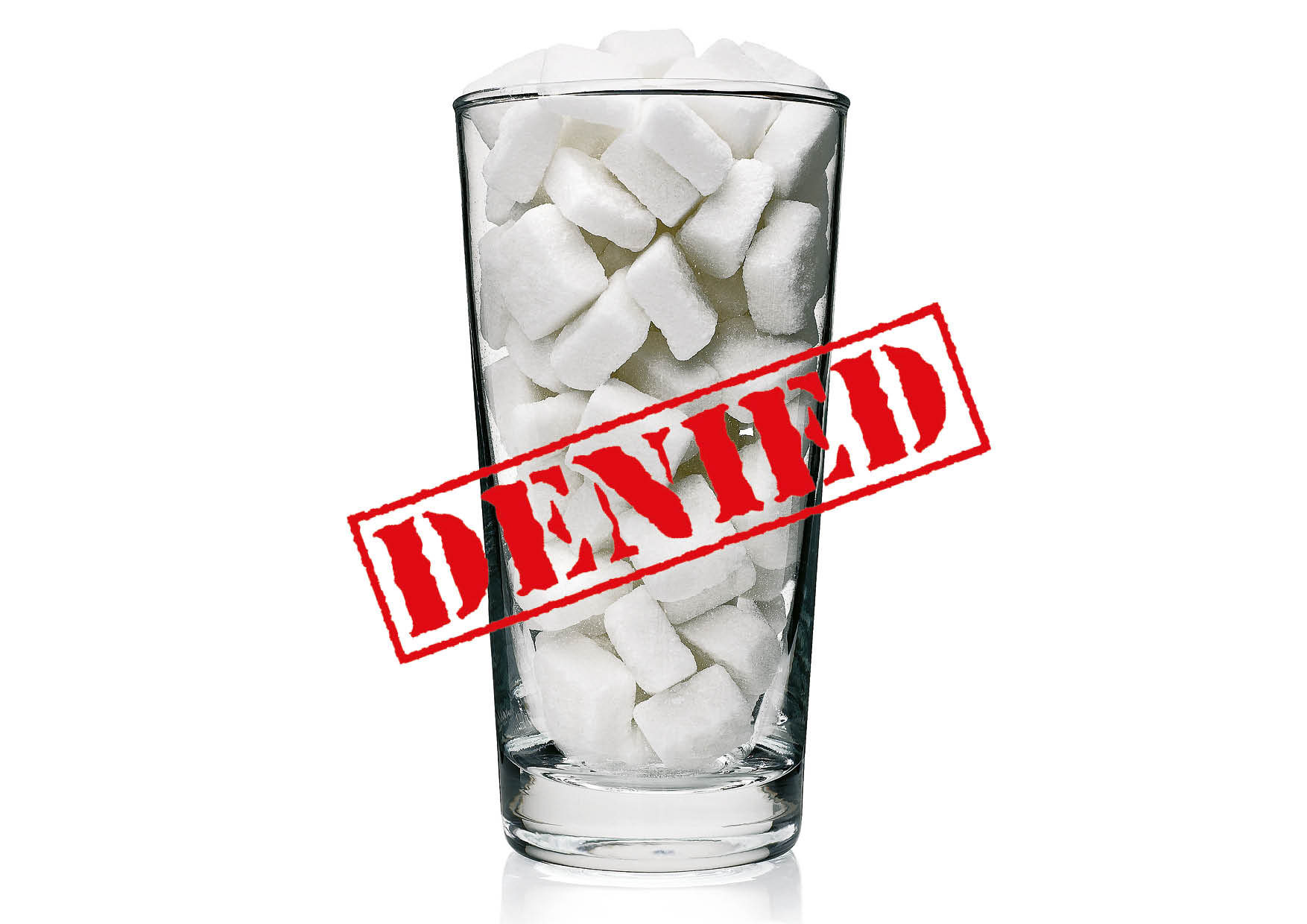
22. November 2016, Basel - According to new consumer study commissioned by BENEO, 57 percent of consumers polled said they actively try to cut their sugar intake. A healthy diet (58 percent), weight management (56 percent) as well as tooth decay (37 percent) were named by respondents as concrete reasons to limit sugar intake.
On the other hand, respondents said they are not prepared to completely forego sugar, with taste beign the number one reason at 58 percent. Twenty-four percent said sugar provides essential energy and 20 percent indicated that sugar acts as "mood food". About two out of three respondents agreed that naturally derived sugars from fruits, vegetables and plants are healthier (64 percent). A similar number also said they preferred natural sugars to low calorie sweeteners (65 percent).
The study of 1000 U.S. consumers, commissioned by BENEO, was conducted by Ipsos, one of the world's leading market research firms.
Toothfriendly teams up with Carrefour and Colgate
Carrefour hosts Toothfriendly road show in its Istanbul malls.
Istanbul, 11 November 2016 - Families visiting the largest shopping centers of Istanbul in November have the chance to spend their day promoting oral health. The partnering trio – Carrefour, Toothfriendly International and Colgate - say the oral health event is an opportunity to give kids and their parents a fun way to learn about the importance of oral health.
Games included giant toothbrushes and art & craft sessions with a real Toothfairy. Dozens of children queued up for free give-aways and game sessions. The event runs through whole month of November in all Carrefour malls of Istanbul.
"I think the best and most important thing is that we're doing it for our community," said event coordinator Selda Alemdar of Toothfriendly Turkey. "It's free, we have great prizes, all they have to do is participate and learn about oral health, and it just brings oral health educators and families together in a very positive way."
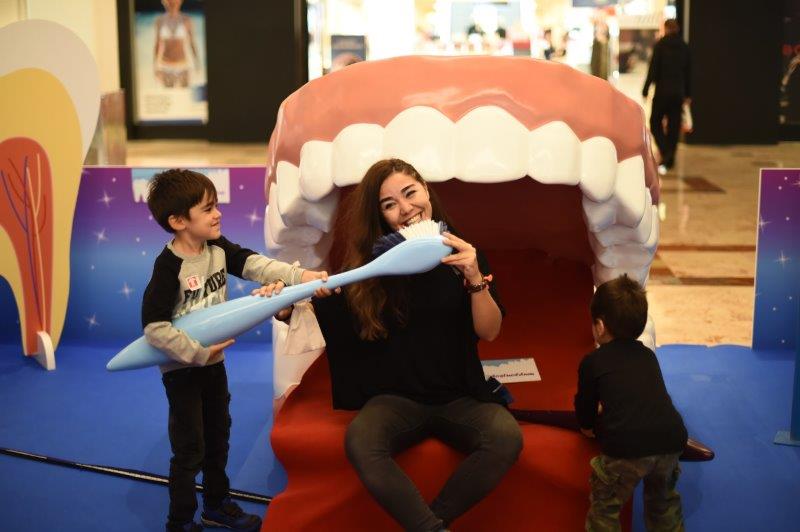



Sugar tax would reduce caries, claims German research
Taxing sugary beverages could reduce sugar consumption and caries increment, claims a recent German study published in Journal of Dental Research.
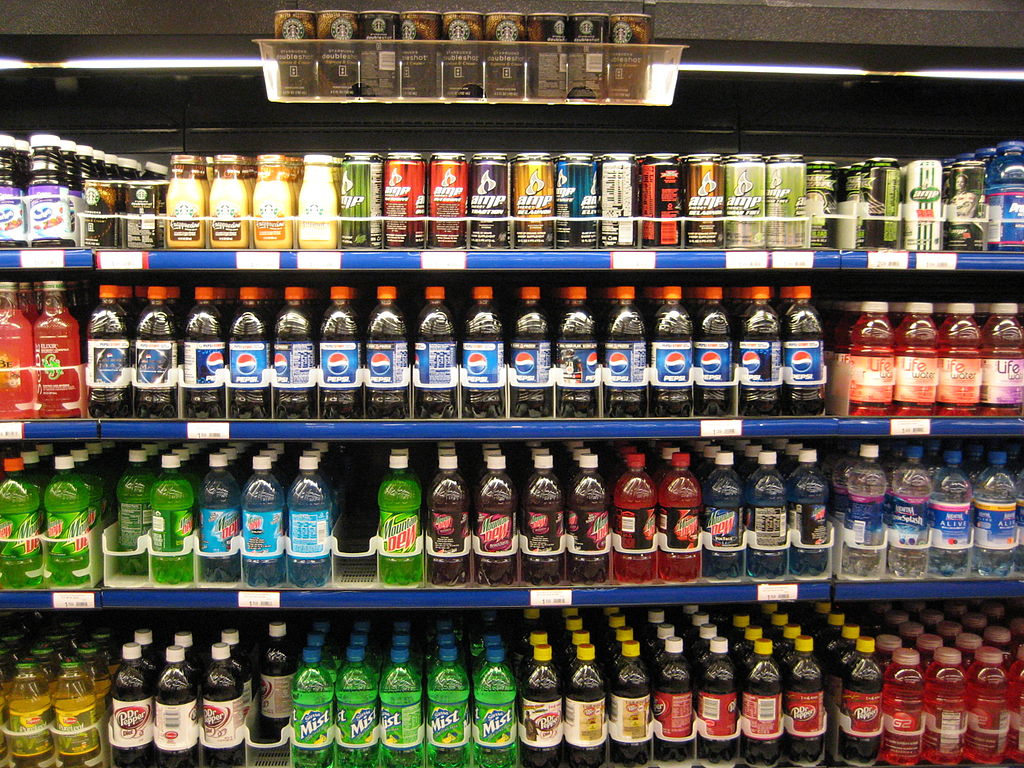 October 11, 2016, Basel - According to the study, the greatest reduction in caries increment (>10%) was expected in males from low- or middle-income backgrounds. The researchers concluded that implementing a 20% tax on sugary beverages in Germany would be likely to reduce caries increment especially in young low-income males.
October 11, 2016, Basel - According to the study, the greatest reduction in caries increment (>10%) was expected in males from low- or middle-income backgrounds. The researchers concluded that implementing a 20% tax on sugary beverages in Germany would be likely to reduce caries increment especially in young low-income males.
Many dental professionals remain sceptical though.
«I doubt that a sugar tax will change bad dietary habits significantly, and particularly not in those segments of the population who would need it most», says Dr. Albert Bär, Executive Director of Toothfriendly International. «Changing behavioral habits is achieved in the first place by proper and balanced information. Introducing a sugar tax in certain foods may help reduce total intake somewhat but it will never have the same impact as information-mediated and emotion-driven modification of eating habits will have.»
Both industry and consumers would benefit more from nutrition education and positive labeling initiatives, such as the Toothfriendly certification mark for non-cariogenic and non-erosive products, believes Dr. Bär.
One quarter of European food carries health claims
A recent CLYMBOL study found that around one quarter of food products in Europe carry health claims.
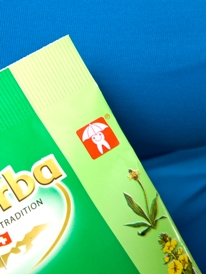 13 November 2015, Basel - Researchers from the EU-funded project CLYMBOL (“Role of health-related CLaims and sYMBOLs in consumer behaviour”) analysed how often and what type of claims and symbols were found on food package and found that one quarter (26%) of all products carried at least one claim. Most of these claims were nutrition claims (64%), followed by health claims (29%) and only 6% health-related ingredient claims.
13 November 2015, Basel - Researchers from the EU-funded project CLYMBOL (“Role of health-related CLaims and sYMBOLs in consumer behaviour”) analysed how often and what type of claims and symbols were found on food package and found that one quarter (26%) of all products carried at least one claim. Most of these claims were nutrition claims (64%), followed by health claims (29%) and only 6% health-related ingredient claims.
In this study the researchers sampled and purchased over 2000 food and drink products, in order to extract and analyse all information available on their packaging. The study was performed in five European countries (DE, ES, NL, SI, UK), making it the first cross-country study analysing and comparing the status-quo of claims on food and drink products in Europe and beyond. The results inform policy makers and help monitor the use of claims across Europe.
See here the full article.
Passive smoking harms children`s teeth
Exposure to tobacco smoke during early childhood increases the risk of dental caries later in life, claims a comprehensive Japanese study.
13 June, 2016, Basel - In a study of over 76´000 Japanese children published in BMJ (2015;351:h5397), exposure to tobacco smoke during infancy was associated with an approximately twofold increased risk of caries in deciduous teeth. The risk of caries was also increased by 1.5-fold among infants exposed to smoking in the household, whereas the effect of maternal smoking during pregnancy was only 1.1-fold.
Although these findings do not establish causality, they demonstrate that poor parental health behaviour is also reflected in the dental health of their children. Therefore, for best benefits, health education should reach both parents and children.
The full study can be downloaded from here.

Dentists call for radical rethink on sugars discussion
While consumers are being encouraged to cut back on the amount of sugar they eat, dental experts say: it’s not the just amount but also the frequency that matters. Also, new healthier sugars are on the horizon.
27 January, 2016, Basel - Eating too much sugar, says WHO, may lead to dental problems or obesity which can cause heart disease, cancer and diabetes.
Not all experts agree to this, however.
„The new WHO guidelines are too simplified“, says Dr. Albert Bär of Toothfriendly International. „Sugar is not bad by definition, but the way some people consume certain sugars is bad for health“, he states.
For starters, there is no such thing as the sugar. Sugar in the chemical sense of the word stands for a number of substances with similar chemical characteristics but widely different physiological properties in terms of bioavailable calories, dental properties, glycemic effect as well as absorption from the gut.
The energy value of different sugars varies from about 0.5-4 kcal/g, the glycemic index from 0-100%, the sweetness from 20% to 100% (sucrose as a reference). In other words, a number of sugars with widely differing properties are encompassed by the chemical term „sugars“.
In its guidelines, WHO does not take into consideration various types of sugar but rather talks about free sugars. They are defined by the WHO Nutrition Guidance Advisory Group as follows: Free sugars include monosaccharides and disaccharides added to foods by the manufacturer, cook or consumer, and sugars naturally present in honey, syrups, fruit juices and fruit.
According to Dr. Bär, the WHO report quite wrongly evokes in the consumers mind that everything that is sugar chemically is equally bad nutritionally. Ignoring the differences between sugars, with regard to both nutritional effects and health effects, i.e. the lumping together of all sugars in the category of „sugars“ for the purpose of nutritional labelling, further cements a wrong perception and indeed misleads consumers about the food they eat.
Also, the term free sugars is problematic as it stipulates a general difference between naturally occurring and industrially added sugars for which there is little if any evidence.
„Furthermore, the WHO report relies completely on the amount of sugar, not the frequency of sugar intake“, critizises Dr. Bär. „ From dental perspective, this is not the whole truth: teeth are rather effected by the frequency of sugar consumption than by the sheer amount. Sipping a soda throughout the afternoon is more harmful than drinking the whole can at one go.“
According to Dr. Bär, either sugar bashing in the media nor a sugar tax will change bad dietary habits significantly, and particularly not in those segments of the population who would need it most. Changing behavioral habits is achieved in the first place by proper and balanced information. Reducing sugar in certain foods may help reduce total intake somewhat but it will never have the same impact as information mediated and emotion driven modification of eating habits will have.
“We need positive campaigns which highlight the healthier alternatives“, suggests Dr. Bär. “And the food industry should be seen as a partner, not the villain.“
Toothfriendly at the ISM 2016
Toothfriendly International will exhibit at the ISM confectionery fair taking place in Cologne 31.1-3.2.2016.
Ricola candies, Smint lozenges and Mentos chewing gums are among the over 100 products carrying the Toothfriendly label around the world. Besides confectionery, a wide range of Toothfriendly-certified oral care products, beverages, spoon-for-spoon sweeteners, pacifiers and medicinal products will be showcased at the booth.
The Toothfriendly booth is located in the aisle between halls 10 and 11. We are looking forward to meet you in Cologne!
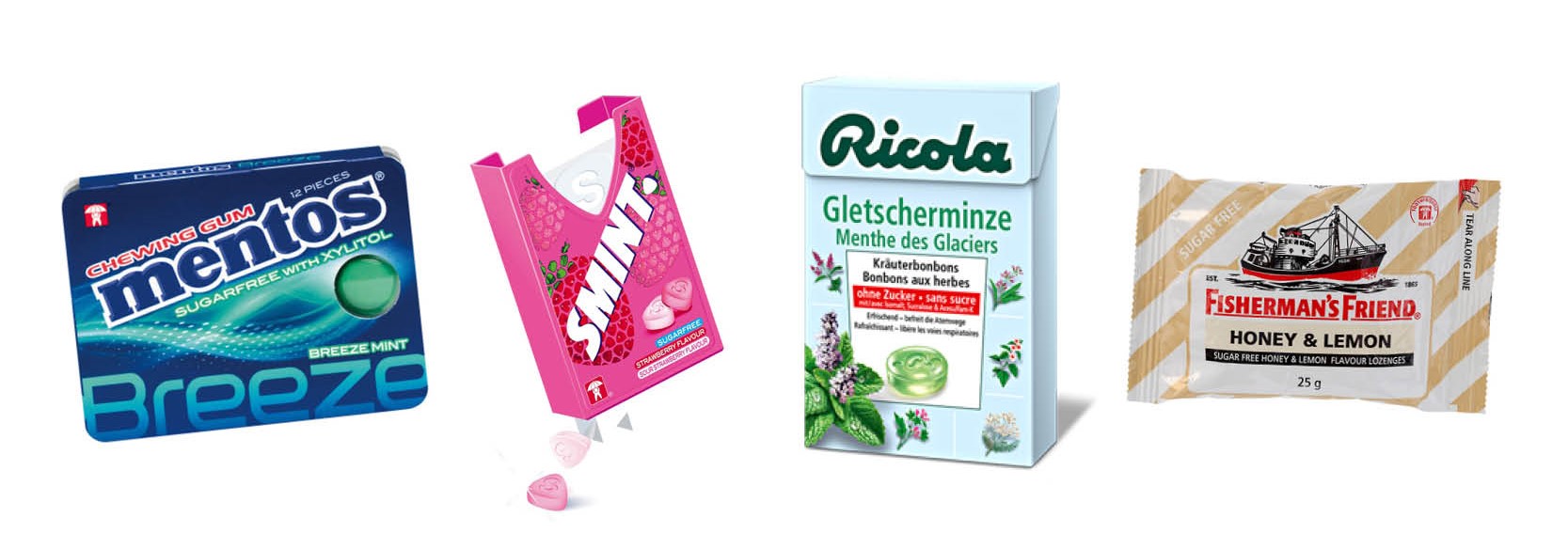
Consumer views on sugar
According to new study, consumers begin to distinguish between "good" and "bad" carbs.
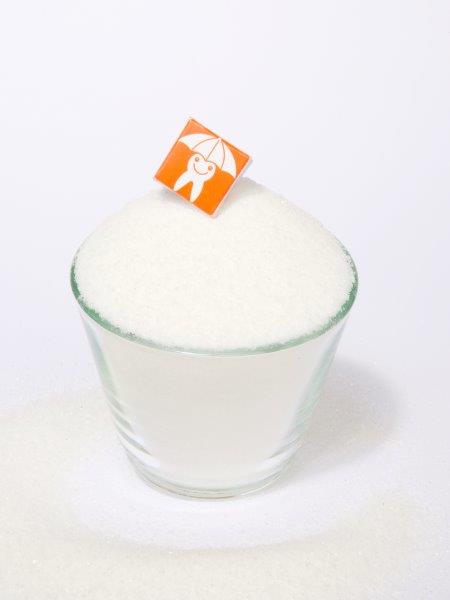 12 September, 2015, Basel - New quantitative consumer research commissioned by functional ingredients manufacturer BENEO shows that consumers perceive sugar as both a ‘friend and foe’ in their nutrition. Consumers’ main motivation for sugar reduction in their nutrition was because of its negative effects on their health.
12 September, 2015, Basel - New quantitative consumer research commissioned by functional ingredients manufacturer BENEO shows that consumers perceive sugar as both a ‘friend and foe’ in their nutrition. Consumers’ main motivation for sugar reduction in their nutrition was because of its negative effects on their health.
58% of those respondents who wanted to eat less sugar said that their major driver was to control their weight. Also, the detrimental long-term effects of sugar consumption such as diabetes were a concern, being mentioned by nearly one out of three consumers who were trying to cut their sugar intake. Although wanting to reduce the amount of sugar consumed, respondents were not prepared to forego the feeling of sugar-like indulgence: 60% said that they ate sugar because they liked the taste and one out of three participants (33%) responded that sugar improved their overall mood.
Despite consumers seeing the benefits of less sugar intake, they also recognised that carbohydrates are the major energy source for body and brain. 46% of respondents stated that the main reason they consumed carbohydrates was that they "give energy".
At the same time, consumers are starting to differentiate between different types of carbohydrate, with more than one out of two participants making a distinction between ‘good’ and ‘bad’ carbohydrates.
Read more about the study here.
Toothfriendly at the FDI Congress

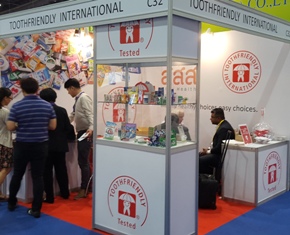
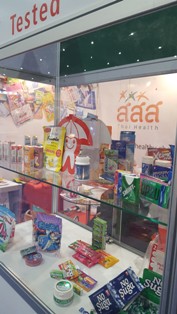
New criteria for children’s toothpaste
Toothfriendly issues new guidelines for the certification of children’s toothpaste.
To help parents identify high-quality toothpaste for their children, Toothfriendly International has adopted general provisions for the certification of children’s toothpastes. The new guidelines have been laid down and accepted by a panel of independent, qualified experts convened and consulted by Toothfriendly International.
According to the new guidelines, the active ingredient in toothpastes should be bioavailable fluoride.
The fluoride content and the recommended conditions of use are as follows:
From eruption of the first tooth to the second birthday:
Fluoride content: 500 – 1000 ppm
Recommended use:
at 500 ppm: pea-size amount (about 250 mg), once per day
at >500 ppm: smear (about 100 mg), once per day.
From the second to the sixth birthday:
Fluoride content: 500 – 1000 ppm
Recommended use: pea-size amount (about 250 mg), twice per day.
From the sixth to the twelfth birthday:
Fluoride content: 1000 – 1500 ppm
Recommended use: pea-size amount (about 250 mg), three times per day.
The terms „pea-size“ and „smear“ should be illustrated on the toothpaste tube, its cardboard box or an inserted leaflet.
Furthermore, the instructions of use shall be clearly legible as well as shown prominently on the toothpaste tube.
The new guidelines can be downloaded from here.
---
Toothfriendly International is a non-profit association working for better oral health. For more information, to discuss Toothfriendly certification or to set up an interview with Toothfriendly International, please contact us.
Toothfriendly in Germany: 30th Anniversary
Aktion Zahnfreundlich e.V. celebrates 30 years of oral health promotion.
April 1, 2015
Aktion Zahnfreundlich e.V. celebrates 30 years of oral health promotion.
The year was 1985: the Berlin Wall was still dividing Germany, the Euro was a distant dream and sugar-free chewing gum only a recent novelty. It was also the year when a group of prevention-minded dentists teamed up for a German Toothfriendly initiative. Since thirty years, the “Zahnmännchen” label – the smiling tooth under a protective umbrella – is the association’s guide to products which are guaranteed safe for teeth.
Established to promote oral health, Aktion Zahnfreundlich e.V. is a non-profit association based in Berlin, Germany. It was founded in 1985, building on the experience of the Swiss initiative with similar mission. The association’s main function is to promote products – confectionery, beverages, OTC medicine – which are not harmful for teeth. In order to carry the association’s “Toothfriendly” label, the products have to be scientifically tested and proven to be without significant cariogenic and erosive potential. Based on the measurement of the pH of dental plaque, the test is a standardized one carried out by three appointed independent university institutes.
According to the association’s Country Manager Hedi von Bergh, the group brings together the interests of the consumers, health professionals and the industry. For consumers the “Zahnmännchen” label serves as a reliable guide to toothfriendly confectionery; for dentists it offers a means for providing positive dietary advice about confectionery to patients, and for the confectionery industry, the logo represents a quality mark that helps communicate the product’s and the company’s engagement for better dental health.
For more information, see www.zahnmaennchen.de
WHO: Sugar Intake Should Be Halved
The new WHO guideline recommends to reduce daily intake of free sugars to less than 10% of their total enery intake.
March 5, 2015, Basel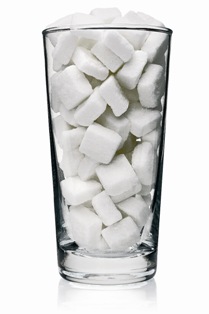
To reduce the risk of obesity and tooth decay, the new WHO guideline recommends adults and children reduce their daily intake of free sugars to less than 10% of their total energy intake. This translates to about 50g a day for an adult of normal weight.
Dental professionals around the world welcome the new WHO recommendation.
Paula Moynihan, Professor of Nutrition and Oral Health at Newcastle University, said: "The less sugar you eat, the lower your risk of dental decay."
Laia Grao of Toothfriendly International, Switzerland, stated: “Consumers need options to refined sugar. Fortunately, sucrose is not the only sweetener available. It is up to the food industry to formulate healthier products with alternative sweeteners.”
Is Caries a Big Issue?
In its new guideline document, the WHO points particularly to the strong association between the intake of free sugars and dental caries. Although exposure to fluoride reduces dental caries at a given age, states WHO, it does not completely prevent dental caries, and dental caries still progresses in populations exposed to fluoride.
According to the WHO, dental diseases are the most prevalent noncommunicable diseases globally and, although great improvements in prevention and treatment of dental diseases have occurred in the past decades, problems still persist, causing pain, anxiety, functional limitation (including poor school attendance and performance in children) and social handicap through tooth loss. The treatment of dental diseases is expensive, consuming 5–10% of health-care budgets in industrialized countries, and would exceed the entire financial resources available for the health care of children in most low income countries.
Read the new WHO Guideline here.
---
Toothfriendly International is a non-profit association working for better oral helath. For more information, please contact us.
Expansion to Oral Care Products
The 26th General Assembly decides to expand the certification scheme to further oral care products.
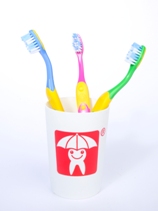 February 27, 2015
February 27, 2015
A milestone decision recognizing the need to endorse oral care products – e.g. toothbrushes, tooth paste – according to clearly specified, measurable criteria – has been adopted by the 26th General Assembly of Toothfriendly International held last week in Basel, Switzerland.
The General Assembly of Toothfriendly International is a two-day event where registered delegates – a unique combination of business leaders, scientists and dental NGOs – discuss and vote on various agenda issues. This year, the Assembly made a consensus decision to expand the existing certification scheme to new product groups.
Dr. Albert Bär, Executive Director of Toothfriendly International, states:
Our brand promise is to make healthy choices easy choices, and this is something that we have successfully been doing with non-cariogenic confectionery products for more than thirty years. But now it is time to focus on other pillars of caries prevention – oral care products and dental services – in order to increase the scope and impact of our association.
The Toothfriendly quality seal is still one of the most wide-spread certification schemes for confectionery products worldwide but its growth has slowed down in the recent years due to economic downturn and the increasing complexity of national food regulation.
The consensus vote of the General Assembly places expansion firmly on the association’s agenda. An independent scientific expert group is called to meet in June 2015 to define the inclusion criteria for new products and services.
---
Toothfriendly International is a non-profit association working for better oral health. For more information, to discuss Toothfriendly certification or to set up an interview with Toothfriendly International, please contact us.
New Toothfriendly Product Launches
New Product Launches at ISM Reflect an Uptick in Commitment to Toothfriendly Certification.
28  January, 2015
January, 2015
At this year’s ISM confectionery fair, Toothfriendly International will be presenting eight new Toothfriendly-certified products.
In Switzerland, Chocolat Frey launched a new Toothfriendly-labelled chewing gum flavour based on the nation’s favourite Ice Tea brand. The idea for the quirky chewing gum concept came from Migipedia, the digital consumer platform of the Swiss retailer Migros.
Halter Bonbons introduced a new range of functional candies featuring exotic ingredients: aloe vera, goji and green tea. The flavours are sugar-free and contain added vitamins, ginseng and collagen.
F.Hunziker launched new Toothfriendly Frambini gummy candies targeted for children. The raspberry-flavoured candies contain added vitamin C.
Ricola is introducing a new «Glacier Mint» flavour to its famous herbal lozenge range. The Toothfriendly mints provide soothing relief to sore throats.
Not only confectionery manufacturers, but also the makers of OTC medicine and baby nutrition make a commitment to Toothfriendly quality.
HiPP is expanding itsrange of baby teas with various Toothfriendly flavours. The granulate tea comes in handy single portion size sticks.
Siemens & Co is presenting Emsillen, a Toothfriendly lozenge for children.
In Turkey, market leader Mondelez is coming up with new flavour variations to its number one mastic gum brand Falim, while Kervan announced the launch of a whole new Toothfriendly-certified gum brand, Bebeto.
«The market for Toothfriendly confectionery is particularly strong in Turkey, with most of the nation’s sugar-free gum manufacturers committed to Toothfriendly certification», commented Selda Alemdar, the Country Manager of Toothfriendly Turkey.
---
Toothfriendly International is a non-profit association working for better oral health. For more information, to discuss Toothfriendly certification or to set up an interview with Toothfriendly International, please contact us.
Germans whip up Toothfriendly gummy bears
German gelatine specialist GELITA has launched a range of dentist-approved gummies.
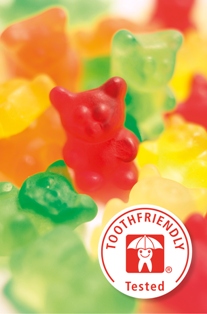 January, 2015
January, 2015
GELITA's new gummy bears have been tested by the University of Witten/Herdecke and are guaranteed safe for teeth. They look like gummy bears, they taste like gummy bears, and they are gummy bears – but they won’t rot your teeth.
“The Toothfriendly gummy bears are sweetened with a mixture of sucralose, trehalose and some xylitol”, explains Laia Grao of Toothfriendly International, a non-profit organization dedicated to improving dental health. “Unlike sugar, this sweetener mixture is not fermented by the oral bacteria and thus does not promote cavities.” Equally important, the gummy bears are demonstrably non-erosive to teeth.
Grao points out that until now, attempts to develop Toothfriendly jellies have failed – some because a potential laxative effect but mainly due to excessive acidity . Acids which are commonly used in gelatin - based confectionery for taste have a demineralizing effect on the tooth surface which may lead to dental erosion.
In contrast to earlier formulations of sugarfree gummy bears , the new Toothfriendly gummy bears contain a high amount of dietary fib er as well as trehalose all of which are known to be well tolerated even if consumed in high amounts.
So the secret of GELITA ’s Toothfriendly gummy bears is a different type of sweetener mixture, low level of acids and non - laxative effect. But do they taste any different?
In our blind tests 90% said they liked it a lot”, says Grao. “But I think the only proof that people really like something is when they ask for a second candy. And they did”.
The German confectionery specialist Zahnfreundchen is the first distributor to launch Toothfriendly gummy bears under its Gummi Fruchtlinge range. “We are currently the only distributor worldwide to offer gummy bears which are demonstrably Toothfriendly and for which dentists’ endorsement has been obtained”, explains Manager Tobias Elger.
---
Toothfriendly International is a non-profit association working for better oral health. For more information, to discuss Toothfriendly certification or to set up an interview with Toothfriendly International, please contact us.



